#twst analysis
Text
This is for @moonlightequin1, my dearest Crowley comrade 🌸🐦⬛ I wanted to find as many comparisons that I could to Crowley and Malleus’ smiles \(//∇//)\ (minus chibis and anthologies)
Exhibit A: Nothing can go wrong- this is what pure joy looks like


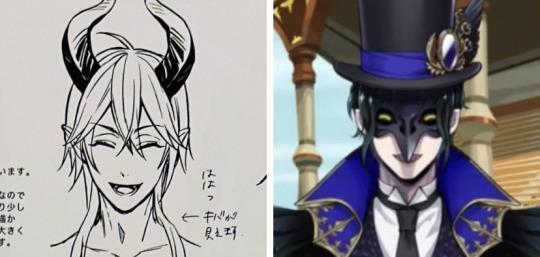
Exhibit B: That smile…that damn smile

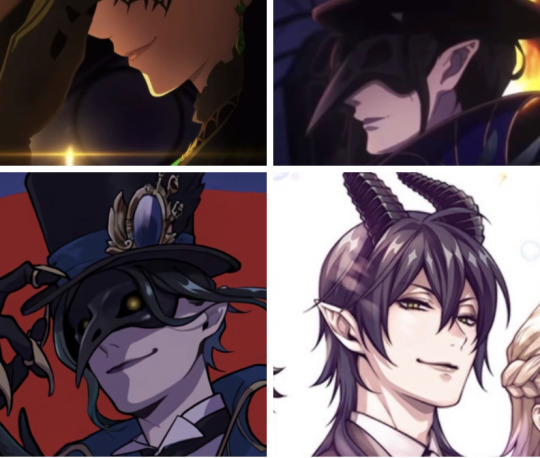
Exhibit C: Suspicious and Frightening
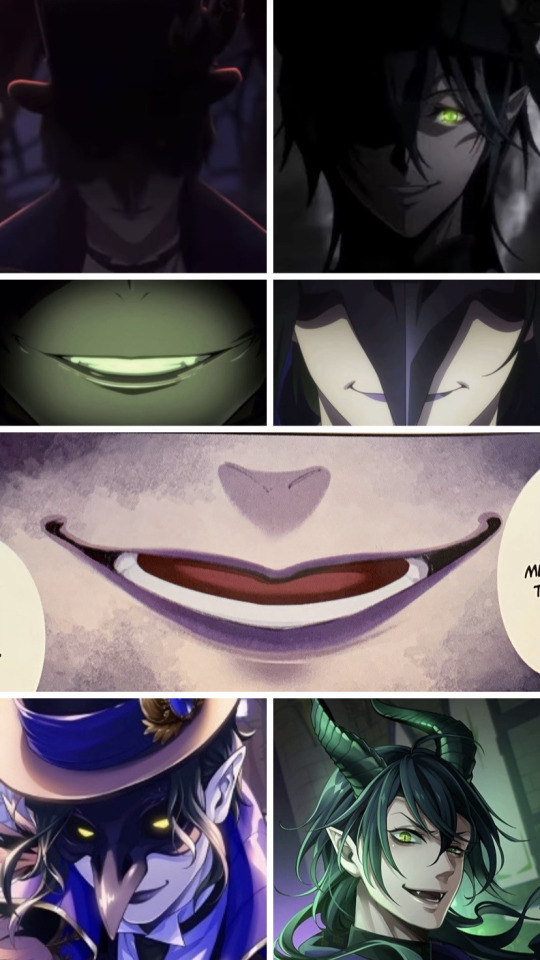

Bonus Section: Official Reference Sheets that has turnarounds at the same angle
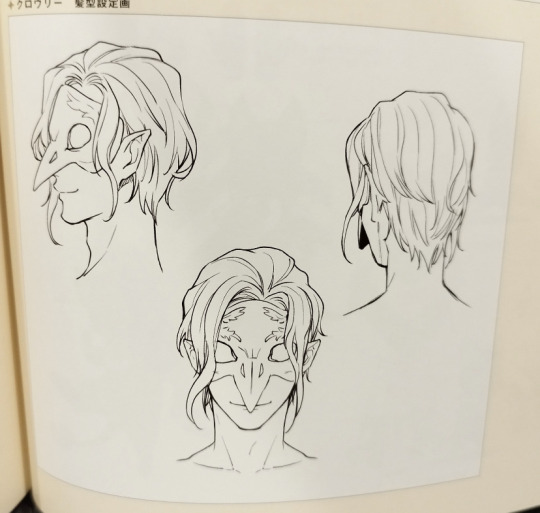

#please forgive the horrendous photo organizing BAJXJDJD#my phone was crying because mobile tumblr has a 10 photo limit#twisted wonderland#twst#twst analysis#dire crowley#twst dire crowley#twst malleus#twst malleus draconia#twst theory#kallistopost#long post
74 notes
·
View notes
Text
thinking about book 6 battle simulations






I was thinking a lot about book 6 lately! (Not for any particular reason, I was just ruminating, haha...)
During the examination segment, Riddle, Azul, and Vil were put into one group and Jamil and Leona were put in the other group. Idia then put them into VR simulations in which (simulated) Trey, Jade, Rook, Kalim, and Ruggie approached the subjects to upset them. This is for the purposes of STYX to gauge their combative capabilities and blot accumulation.
What I noticed on another read of these parts was that Idia makes sure to inform all the subjects they are about to enter a VR simulation BEFORE they dive in... and yet despite this, group 1 (Riddle, Azul, Vil) was still caught off-guard when Trey, Jade, and Rook attacked them. Meanwhile, Jamil in group 2 automatically defers to Kalim but Leona is the one who notices something is fishy about the situation. Now, now... this is interesting 👁️ Why might this be, I wonder~ (You bet I'm going to analyze the heck out of these small details!)
***Main story spoilers up to book 6!!***
First thing to consider: it's possible that perhaps the characters don't fully understand what "VR simulation" is, as most of them did take a while to come to their senses. Of the 5 subjects, Riddle is the most likely to fall into this category. He seems to be slightly confused by the concept of a "virtual space" when Idia explains the examination to them (which likely conflicts with Riddle's very traditional understanding of "tests"). Furthermore, Riddle has expressed in Endless Halloween Night that his mother did not allow him to play video games or to watch TV so he'd usually do crosswords or solve other puzzles for fun. He's not completely technologically inept (like Malleus), but Riddle does have a somewhat limited scope of how items and procedures are to be used, especially if it lies beyond its normal means. It's likely that he has not thought of VR simulation being used in the scenario in which he finds himself in now.
The other 4 subjects, however, most likely understand what VR is and shouldn't be confused by the simulation. Azul is very savvy and keeps up with trends, which can factor into his business(es). He even brings up streaming as a potential source of revenue in book 6; man has his fingers on the pulse of pop culture to know what will sell. Vil, being a celebrity and the leader of the Film Research Club, must have an understanding of various technologies used to achieve certain effects (especially as director of his own projects). Jamil constantly deals with Kalim's requests and, being in Kalim's social bubble, must get exposure to all kinds of crazy technologies. Leona, being a knowledgeable prince, surely must understand the concept of VR simulation.
Okay, so... why did they (mostly) still get "tricked" by the simulation anyway? The key words today would be "trust" and "dependence".
Thinking about it, there's one thing that separates group 1 from 2: the boys in group 1 have a tendency to rely on others for support and validation whereas the boys in group 2 are consistently shown to be more independent than their peers (even if they, too, seek validation). Let's go through them one by one!
GROUP 1
Riddle
Riddle is presented as a tyrant that rules with an iron fist, particularly in book 1 where he stars as the main antagonist. However, it's also pretty blatant that Riddle has become increasingly aggressive due in part to others enabling him. Ace specifically calls out Trey for this, saying that his failure to intervene or to quell Riddle's temper has resulted in Heartslabyul students suffering for it. Cater is also complacent, as he and/or Trey often follow Riddle's orders and remove Adeuce from the dorm multiple times in book 1. Riddle relies on these upperclassmen to listen to him and carry out his bidding, and he feels validated when they do. It's a lesson he has learned from his mother. He is the most powerful, and therefore he should be the most correct. Notice how Riddle is quick to anger when others refuse to obey him and how often he demands for them to conform. He becomes enraged when the Heartslabyul mobs rebel and chuck an egg at him. But what hurts him most of all is, perhaps, Trey turning too.
Riddle was mad about the mobs acting up, yes, but he still did not overblot. Not yet, at least. No, Riddle overblots only AFTER he tries to attack Ace with the rose trees... and Trey steps in with his UM to overwrite Riddle's collar, turning it into cards. Trey's relationship with Riddle cannot be understated here. In this very moment, Trey, Riddle's childhood friend (one of his first friends), vice dorm leader, silent yes man, his most trusted confidant, has betrayed him. He is proving Riddle wrong, that the most powerful mage is not the most correct. "Are YOU going to tell me that I'm wrong too? After all I've done to protect the rule of law?! [...] I... I refuse to believe this!"
From these examples, we can clearly see that Riddle is someone who is reliant on others--not that he isn't a capable mage, but rather he is reliant on others for his own sense of self-worth. Indeed, even in his post-OB flashback, he indicates feeling proud and excited when his mother praises him for good grades or successfully performing a spell. This is reiterated many times over in book 1, in which Riddle feels satisfied and even smug when his students fall in line, and spirals into uncontrollable rage when they don't. There are a select few whom Riddle has chosen to place his faith in, and Trey is one of them. Trey, who gave him his first slice of strawberry tart and has been supporting him as his vice for over a year now (since Riddle became dorm leader in his first week as a first-year student; now is the start of Riddle's second year). That's why he feels so hurt when Trey is suddenly chastising him, telling him that he's behaving irrationally.
If we reexamine Riddle's post-OB flashback, you'll notice that Riddle says he is lonely without every outright stating the word "lonely". The phrasing makes it sound as though Riddle does not understand his own loneliness, like he doens't even know the word or want to acknowledge it as reality. He is awkward and unsure around Trey and Chenya, who invite him out to play. He follows his mother's rules because he believes that is what will bring him happiness. He wonders why, in spite of following all those rules, he still feels hollow inside. Then, once Riddle has awoken, he confesses that he always wanted to play more with Trey, and that he wants to talk with everyone after a meal. Riddle. at his core, craves companionship rather than dominating his peers. Trey was one of the few friends he ever had, and so Riddle puts a lot of stock into his support. This may be why he was quick to believe the fake Trey in the simulation, and why he looked so shocked when Trey started attacking him. Here is a boy who has already been betrayed once, experiencing that same betrayal again at the hands of his childhood friend. How scared must he be of losing his oldest friend, of Trey turning his back on him or seeing him as a monster? 😭
Azul
Due to the bullying he experienced in his childhood, Azul works very hard to maintain a new image of someone who is cool, confident, and composed. Part of that is passing himself off as someone who is large and in charge, while posing Jade and Floyd as his lackies who do whatever he tells them to. The reality of the matter is that the twins are very much... there to do their own thing, and they just kind of go along with Azul's schemes because they seem to be a lot of fun. When you stop to consider it though, Azul definitely puts a lot of trust into the Leech brothers even though they're both shady and can be flippant at times. It's the twins going around and advertising Azul's services to the student population. It's the twins who help him expand his business and acquire new items (as all three's Dorm Uniform vignettes are about the Octatrio conspiring to acquire the rights to and/or advertise their new drinks). It's the twins who are asked to run the Mostro Lounge whenever Azul is absent. Time and time again, Azul falls back on Jade and Floyd. They've been with him since middle school.
In book 4, both Azul and Floyd insist that they aren't really "childhood friends", but they do consider each other "equals". As Azul describes it, "I strongly doubt Jade or Floyd have any binding allegiance to me. This is all and elaborate game of pretend to them. [...] If I made a poor choice as leader--or even simply a boring one... They would turn on me instantly and seize the dorm leader seat for themselves." Floyd follows with, "We ain't got any plans to challenge him, either... for now, anyway. Aha ha! [...] We stick with [Azul] now 'cause it's fun. If it stops bein' fun, we drop him like a bad habit. Easy." The twins and Azul are both very aware that their relationship is temporary and transactional one. Azul himself has even fully considered the possibility that Jade and Floyd may one day turn on him. This is all true--however, I also believe it's possible that the Octatrio are not being entirely truthful to themselves and do actually care for one another beyond the confines of their business ties or "having fun". In book 3, Jade and Floyd sense that something is wrong, and their immediate thought is to go check on Azul because of this gut feeling. Jade warns Azul of the consequences of misusing his UM. They are also the first to check on Azul after his OB and insist that he rest and find it within them to gently tease him over the situation.
Even the way they address each other is "special". Jade and Azul have a tendency to be polite and use the honorific "-san" after everyone's name... except for each other and Floyd. Floyd, meanwhile, tends to give everyone a nickname... except for Jade and Azul. They drop these naming conventions within their group because that's how much they know and trust each other. Further proof of this is that when Floyd first meets Azul in the post-OB flashback of book 3, he calls Azul "Octopus-chan". Azul used to have a nickname, but no longer has one. This implies that a lack of a nickname actually indicates that Floyd is more intimate with someone than if he had nicknamed them. The same goes with Jade and Azul, who are usually so formal and polite.
I've already established that Azul acts in ways which indicate that he is close to the twins, as much as he tries to deny it and come off as tough. He drops the honorifics for them and he trusts them to do his bidding. What I find most telling, however, is when Jade and Floyd check up on him right as he's about to OB. "Jade! Floyd! Ahhh, you've finally come back to me," Azul says (if you listen to his voice, he sounds SO relieved). "Would you believe that thanks to these FOOLS, I've lost all of my contracts? Which is why I'm going to need your powers now. Come on, give them to me!" This is notable because, prior to this, he was forcibly ripping powers out of mob students. But now with the twins--Azul makes a CONSCIOUS decision to ask Jade and Floyd for them to willingly give up their powers to him. Azul is emotional and acting without tact here, but he STILL stops to ask the twins for them to surrender their magic. He cares about getting their consent specifically. When the brothers deny him and Floyd says Azul has become lame, that's when Azul snaps. His loyal henchmen are refusing his request and he's lost all his accumulated wealth. He's going to become the weak, friendless crybaby he once way all over again.
Knowing all of this, it makes sense why Azul was as startled as Riddle was when the simulated Jade attacked him. Azul claims that he anticipates this day--but he still seems to disturbed when it actually happens. It's true that perhaps this surprise comes in part from Azul having no indication that the twins were getting bored of him, so this is coming out of left field in his perspective. But... it could also be that he's hurt by the sudden shift, even if he and the twins have been telling themselves all along that they'd toss each other out without a second thought once they lose interest. This calls back to Azul's concerns right before he overblots: that his "business partners" (whom he refuses to call his friends) have lost interest in him and will now leave him alone and with nothing. He relies on the brothers not only for labor, but as his company and his confidants. When that's taken away from him... what does Azul have left that's worth anything?
Vil
Vil is another person who typically passes as very independent. He looks after himself quite well and is often the one nagging others to do the same. The thing with him is... he's still a celebrity at the end of the day, and a celebrity like him is always aware of his public image and the eyes on him. That's Vil's Achille's heel: as a celebrity, he is constantly concerned with how others perceive him. This is a lesson he learns in book 5--that he shouldn't let other people's judgment of him or a silly popularity contest determine his self-worth. Ah, but let's remember... book 6 begins like a mere DAY after book 5. Sure, Vil's character arc may be over, but that does not mean that he has suddenly completely changed. Up until yesterday, he was aggressively training to overcome his rival and to show the whole world his true beauty. Vil still, to some degree, finds value in how he looks and how others see him, as it strongly ties into his career. To this end, he sees Rook as a valuable individual.
Now, there's a lot of contention about whether or not Rook is a good influence on Vil or not, as some interpret his commentary as derogatory or unnecessarily critical. I'm not going to get into that; here, I am going to speak plainly about how Vil himself views Rook's feedback. In Vil's Labwear vignettes, he confides in Trey that he relies on Rook's keen observational skills to reflect the truth back to him. A celebrity must look at his best, and he can count on Rook to not mince his words and point out even the most minute of changes at a quick glance. (Vil himself is also extremely strict with himself, but lacks the superhuman abilities that his vice dorm leader does.) Rook has been doing this since long before he even transferred to Pomefiore, critiquing Vil's performances and such, not just his looks alone. This led into long discussions and debates between the two, which demonstrates how much Vil values Rook's perspective. Even back then, Rook was one of Vil's greatest supporters, but not exactly a totally blind "yes man". He is offering the kind of feedback that Vil seeks, not empty, sugar-coated niceties. This is why, in spite of his betrayal at the end of book 5, Vil eventually accepts it, as he trusts Rook's keen eye and judgment.
What's interesting about book 6's examinations is that Vil seemingly takes charge of his group. When approached by the simulated classmates, Vil steps up and, after a moment of silence, says, "No... It's nothing. Let's go." (Vil is known as a skilled actor and can easily sniff out an act himself. Was the silence hesitation as he, Azul, and Riddle reevaluate the scene? Hard to say, but I'm assuming that STYX's state-of-the-art tech was able to perfectly simulate Rook, and thus confused Vil and co. for a while.) Rook strikes him with a spell, and that invokes a great emotional reaction from Vil, who seems to be the most aghast of the group. The fake Rook then declares that he's going to claim the dorm leader seat from Vil, which shocks him. "As you know, I appreciate beautiful things. Hence... I can hardly allow someone who's acted as ugly as you to occupy the Fairest Queen's throne!" The scene then cuts away to a battle.
Now, while we don't get any extra dialogue from Vil to show his reaction, one interpretation could be that he was stunned into silence. Why is this a believable occurrence? Because the fake Rook called Vil out for "ugly" behavior. This is significant because back when Vil was overblotting, he was desperately shouting for people to "not look at him" because he's "so ugly". Here, ugliness does not mean literal ugliness or something that is visually unappealing. The "ugliness" being spoken of refers to being morally rotten, as Vil was speaking on his guilt after resorting to dirty tactics to try and take out his rival (when he had previously sworn to win on his own merits alone). The simulated Rook might be referring to this, which induces great shame in Vil, who is aware of the weight of his sins. Heck, book 6 even starts with Vil taking accountability and sincerely apologizing to the whole NRC Tribe for causing them trouble. Vil blames himself for their team losing, as it was his OB that forced them to fight and physically wore them out before their big performance. "What does it matter who forgives me?! I can't... I can't forgive myself!" He may still have lingering guilt regarding this incident, hence why he's the one predominantly reacting when the vice dorm leaders betray group 1. His mirror and huntsman, who speaks only the truth to him, now tells him of his ugliness. What else can that be, if not the truth reflected back at him?
GROUP 2
Jamil
To be clear, Jamil did not automatically go after the simulated Kalim. He automatically defers and tries to go along with his dorm leader (and only starts fighting once Leona declares the simulation for the sham it really is). Why? Surely Jamil is sharper witted than that. To this, I say... of course, it's just that Jamil's so used to being a servant that he reverts back to submissiveness as soon as he's put in a circumstance where there's a power dynamic. He’s not the one relying on Kalim—Kalim is often the one relying on him.
You need proof of Jamil's servile mindset? He was intentionally talking down his own skills ever since book 4 and, according to Azul, has been purposefully maintaining painfully average grades (which, in of itself, takes a lot of effort). Admittedly though, those are conscious choices, not unconscious ones. But how about back in book 5, when Vil announces him as one of the lead vocalists and Jamil's immediate reaction is not to accept it, but to humble himself and insist that Kalim would be better suited for it (when Kalim actually isn't)? Jamil has to stop himself, back up, and accept the nomination, which he has earned for himself, rather than relinquish it to someone less deserving. Years and years of serving someone else, forced to play the part of the inferior servant, will beat that attitude into his mind, regardless of how much he resents the position.
Even now, Jamil feels like he usually has to follow someone else's lead. Leona, the upperclassman and dorm leader, provides that lead for him in the VR simulation. This leadership + independence is something they would butt heads over later in book 6, as Jamil begins to act overprotective of his current charge (Leona) as he does with Kalim. While Jamil has played the part of Kalim's attendant and childhood friend, the reality is that Jamil cannot stand those roles. He desires to stand out and to be recognized--something which is evident in book 4. Before he brainwashes the Scarabia students, he's always framing himself in a positive and helpful light to them and speaks humbly about his abilities. After he brainwashes the Scarabia students, he has them heap him with praise that he had never gotten in his childhood. In the post-OB flashback, we see Jamil's parents scolding him for outperforming Kalim, even in something as simple as a game. The headmaster of a great arcane academy overlooks him in favor of someone far less capable.
Jamil knows he can be great, but he's intentionally being told to not reach those heights. He feels stifled and trapped, and no one understands his plight that he cannot escape from. This results in Jamil distancing himself from others and coming to rely on himself and himself alone to make his wishes come true. He can't rely on his family, who are beholden to their legacy of being servants to the Asims. He can't confide in friends because none of them are quite like him, and Kalim would ignorantly brush it off. He can't tell third parties because, as Crowley as demonstrated, they dismiss him outright. Jamil, as he acts throughout book 6, is doing so in an effort to find his own strength and to be able to act on it with the freedom he seeks. To play support not because he has to, but because he, the individual, wants to. As Jamil states before overblotting, he wants to "be free" from these precarious circumstances where a wrong move could doom him and his family... but he only has so many liberties to work with. This leaves him in a strange limbo situation where he still isn't fully independent but desperately wishes to be. We see him fighting against the restraints, and to varying degrees of effectiveness depending on the context and his state of mind within that context.
Leona
From a young age, Leona seems to have worked tirelessly to obtain recognition. Like Jamil, Leona was in such a position (second-born prince) that, despite his efforts, he kept being rejected and beaten down again and again. As we see in his post-OB flashback, this is what eventually broke Leona’s spirit and made him develop a pessimistic outlook on his prospects for the future. The thing is, even though Leona does not really have hope for himself, he still manages to inspire hope in other people, from underclassmen to the students of his dorm. Book 2 is entirely about Savanaclaw looking to Leona to save their own futures, and him trying to do so for their sakes. His club mates extol how he can so quickly hone in on their best skills and advise them on how to sharpen those skills. Jack admires Leona’s plays, so much so that he wished to one day play alongside Leona. He’s even able to get beastmen of different species to get along and live peacefully under his rule when this has historically been difficult for his older brother to manage. All in all, Leona has all the makings of a leader. He stands out from the crowd, knows when to leverage his power and intelligence (playing smarter, not harder), and commands with ease.
… That being said, Leona’s presence can be so powerful at times that it’s also isolating. This was the case for his childhood, which is depicted to us as many palace servants being fearful of Leona’s devastatingly strong magic. He also uses this strong magic against his dorm mates when their intentions clash in book 2–and he comes close to killing someone in the process. He’s also just notorious in general for being grumpy or unfriendly toward others, including one instance in book 5 when he seems upset that you’ve showed up in his classroom. Leona drives people away from him, whether because of his strength or because of his prickly attitude.
At the same time, i would also describe Leona as a tactician that keeps some degree of distance from those he commands. He makes it clear he's willing to use others to achieve his own goals and does so many times over. Book 2, when he tries to take out Malleus to help his dorm leaders while also trying to prove to himself that he's capable. Book 3, when he helps Yuu and co. dissolve the contracts including one of his own he made with Azul, etc. Leona knows how to best use his own abilities, as well as those of others. That's what makes him so formidable--he can read others and judge the situation extremely well, and he knows when it is smart to fight and when to tactically retreat (such as in book 6, when he immediately surrenders to STYX agents rather than make a scene). Leona is a self-sufficient man.
There’s the question of Ruggie, of course. Leona is often depicted as lazy and relies on Ruggie to do many daily things for him, such as laundry or fetching food. This obviously throws a wrench into the claim that Leona is more "independent" than those in group 1, doesn't it? He doesn't even come close to Jamil, who actually does all of these tasks himself. Well, not exactly. I don't think "independence" here really comes down to that alone. Riddle, Azul, and Vil all relied on Trey, the twins, and/or Rook to some significant degree to inform their own senses of self. Jamil had this belief of deferring to his "betters" (the Asims) instilled in him, regardless of his personal feelings on the matter. And Leona? Leona does not significantly rely on Ruggie for his self-worth (dude was 100% going to sand him in book 2). Yes, Leona was likely looking to help his dorm members in part to prove to himself he is capable of leading a pack, but he gives up when he realizes it was a fruitless effort. He doesn't become reinvigorated to keep it up or to try again, even when his dorm members (Ruggie included) plead to him. Leona is acting selfishly, and he refuses to acknowledge their perspectives--he's set in his own ways and is driven by his own thoughts, not those of the people around him. Perhaps this is what allows him to discern truth from lies with such clarity, as it is Leona who rouses Jamil to his senses and leads the charge against the VR simulation Kalim and Ruggie.
#twst#twisted wonderland#Riddle Rosehearts#Azul Ashengrotto#Leona Kingscholar#Jamil Viper#Vil Schoenheit#Idia Shroud#disney twisted wonderland#disney twst#book 6 spoilers#notes from the writing raven#Trey Clover#Ruggie Bucchi#Cater Diamond#Jack Howl#Savanaclaw#Octavinelle#Tweels#Jade Leech#Floyd Leech#Kalim Al-Asim#Scarabia#Rook Hunt#twst analysis#twisted wonderland analysis#twisted wonderland character analysis#twst character analysis#Ace Trappola#Dire Crowley
97 notes
·
View notes
Text
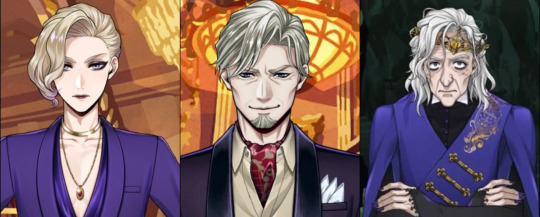
i love how diverse in aging Vil's story is. It would've been easy to surround "Vil Schoeheit" with youthful things considering his character archetype, but I'm glad they're not holding back in adding blemishes whenever they showcase actual aging.
This reminds of Malleus' line that there is a beauty in the withering process of statues/gargoyles. In a way, Vil is like an statue (like a celebrity) but he is as well not immune to aging and I'm glad TWST wrote him as appreciated of aging instead of avoiding it
I know its been said a lot that Vil is not vain. He's not fixated on conventional beauty, but its really comforting to see the beauty icon is the one who believes aging is beautiful as well and is graceful about it, not just on others but also himself yk.
I love the realistic flair of "aging" in a story about really young people and growing up lol
#twst#twisted wonderland#disney twisted wonderland#twistedwonderland#malleus draconia#lian notes#disney twst#twst malleus#twst vil schoenheit#vil schoenheit#twst vil#twst tapis rouge#twst analysis#twst headcanons#twst eric venue#eric venue
2K notes
·
View notes
Text
After knowing what we do in book 7, the real reason Lilia wasn’t included in Glorious Masquerade was because he would have straight up murdered Rollo in cold fury.
No buts or ifs, no excuses.
Rollo tried to hurt his boys: one of which took forever to hatch and is all he have left of his best friends/siblings and sees as an older son, another is a son he raised himself from the cradle he found him in, and another is the grandson of his best friend and is the youngest he loves to toy with.
And Rollo tried to kill them??
Lilia would have straight up taken his hatchet and don the mask of the General in how angry he would have been and no one would know.
For all anyone would be able to tell, Rollo would have fallen to his own plan tragically. Maybe even pushed off the bell tower into a bed of crimson flowers.
No one the wiser.
(He’s had blood on his hands from war, what’s one more?)
#lilia vanrouge#malleus draconia#twst silver#sebek zigvolt#twst glorious masquerade#diasomnia#twst book 7#twst theory#twst analysis#twst theories#rollo flamm#rollo flamme
1K notes
·
View notes
Text
Found this thread on Twitter about Kalim (and a bit of Jamil) and i think it explains his character sooooo well
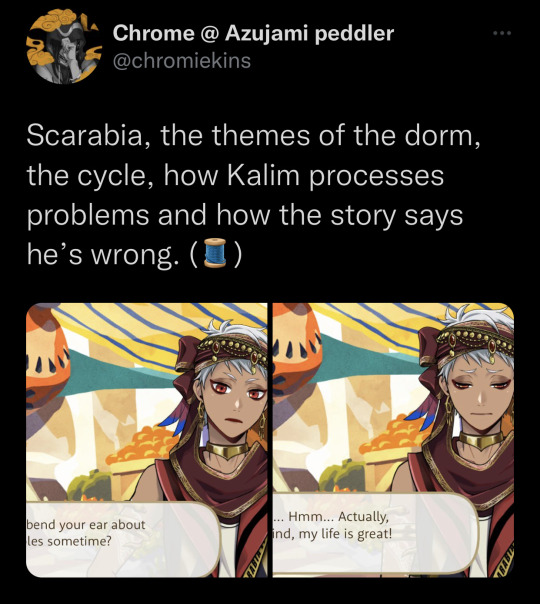
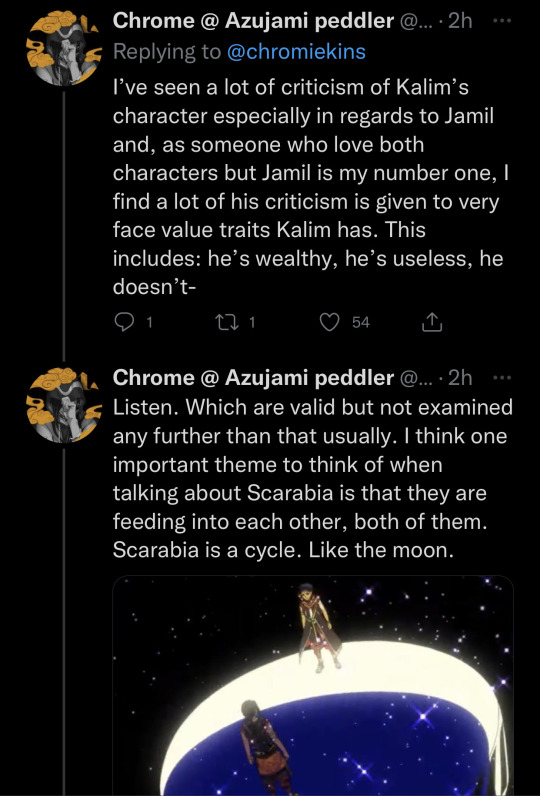
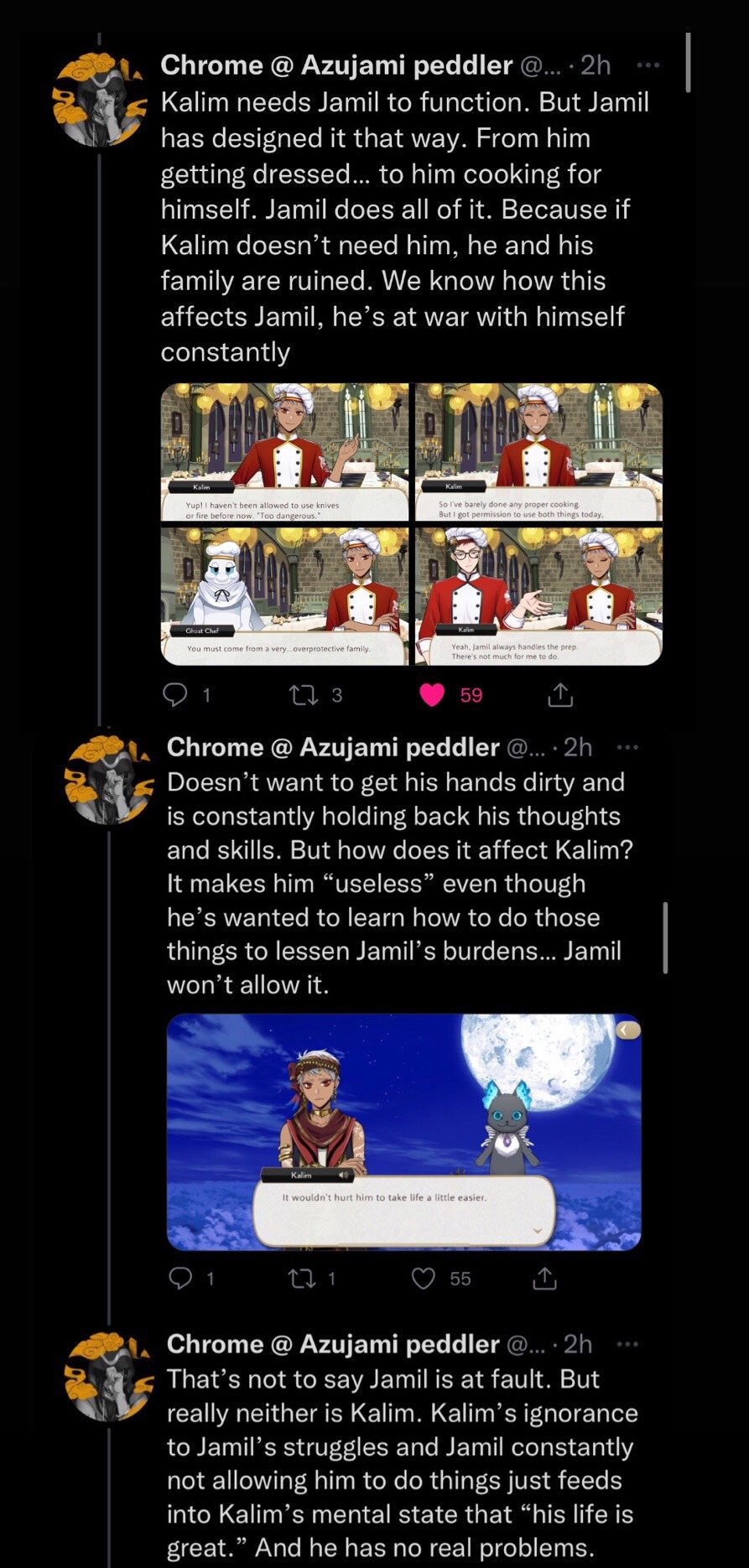
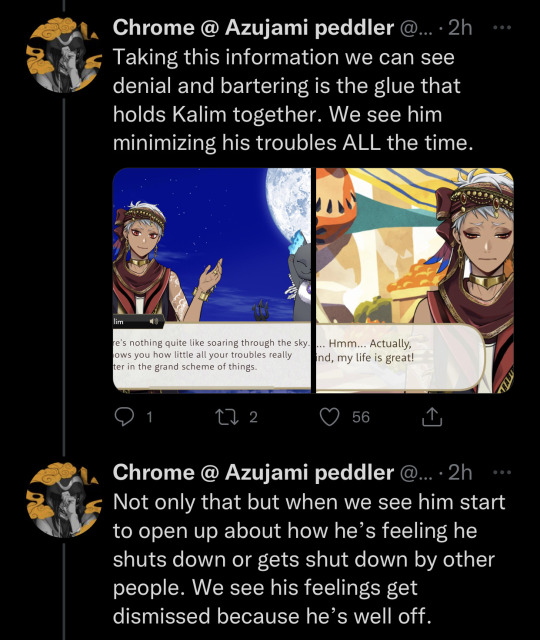
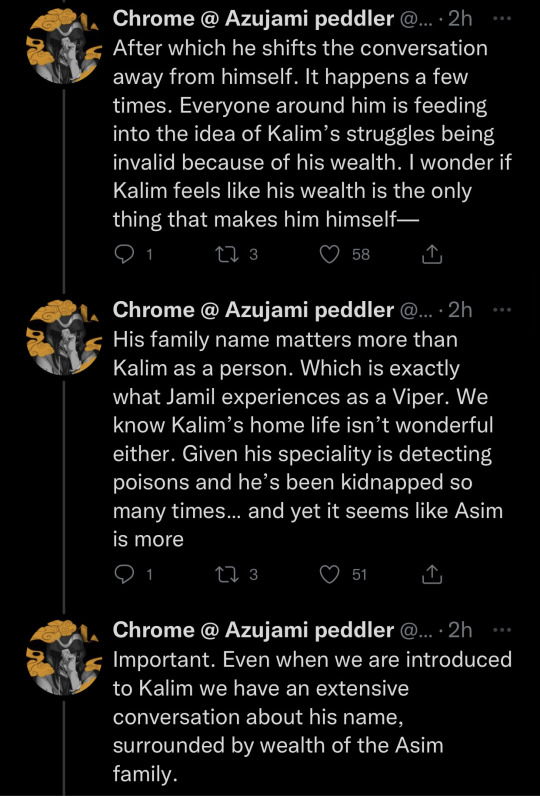
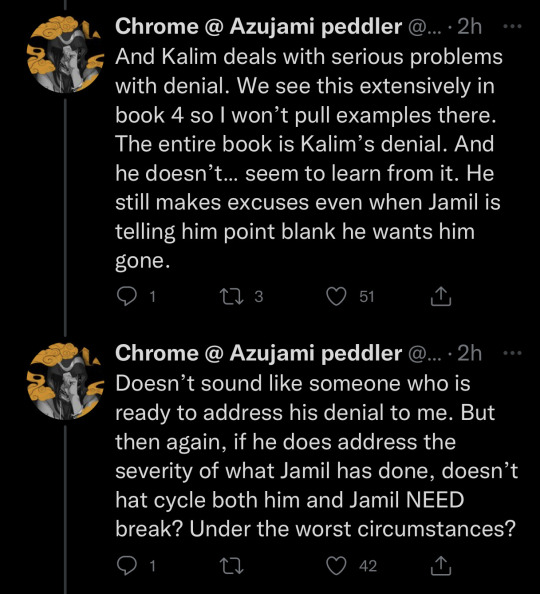




#twisted wonderland#twst#twst wonderland#twst characters#twst analysis#twst kalim#kalim al asim#twst jamil#jamil viper#twitter
1K notes
·
View notes
Text
im just gonna come right out and say it:
pretty much everyone in this fandom portrays Silver as this perfect, flawless, polite, beautiful, princely, romantic gentleman who can do absolutely no wrong in his life ever. which is… not really accurate at all.
he’s odd. he struggles with showing emotions and doesn’t understand social cues very well. his dorm uniform vignette is literally about how people find him strange and unapproachable due to his lack of expressiveness. in his lab coat vignette, Jamil straight up calls him weird to his face and he fully agrees without hesitation.
and in one of his voice lines, he calls Yuu strange just for wanting to hang out with him. stop and think about that for a second. he considers himself boring and doesn’t expect anyone would want to spend time with him. maybe he used to try and make friends, but people kept avoiding him, saying that he wasn’t fun to be around.
he’s not the handsome guy that everybody in the school falls for, he’s the quiet kid who doesn’t say much or has any friends outside of his own personal circle. and i think that has a lot of potential for angst.
#if u reply to my post with smth like ‘oh but he IS perfect and flawless and princely’ i will actually fucking block you#youre free to disagree with me ofc but please dont be annoying about it#read a vignette instead of an x reader i am begging you#i wrote this on zero sleep so if i seem annoyed or my wording is off thats why#twisted wonderland#disney twisted wonderland#twst silver#twst analysis#diasomnia#chemy’s concoctions 🧪
483 notes
·
View notes
Text
some thoughts on how lilia views love
I’ve been watching through the Stitch event and there’s a bit of dialogue Lilia says that unfortunately made me Think, so I wanted to gather my babblings here.
This post contains spoilers for: Book 7, Tsumsted Wonderland 2, Lost in the Book with Stitch, Spectral Soiree/Endless Halloween, and Tamashina Mina
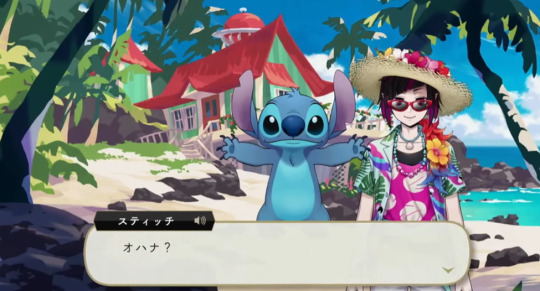
After spending the day fighting off Gantu’s robots, scavenging for food, and exploring the island, the boys rest for a bit in an old cottage they found. Lilia wants to take the opportunity to spruce up the cottage and make it more resort-like while they’re enjoying this “vacation”, and Riddle and Jack are both surprised and a bit peeved to hear him say this.
Riddle: Don’t you want to find a way off this island as soon as possible, Lilia Senpai? Malleus Senpai, Silver, and Sebek… Everyone at Diasomnia must be worried sick about you right now. I should think you’d want to assuage their concerns a tad bit faster!
Lilia: …Thing is, I trust them.
Riddle: You trust them?
Lilia: Mm-hmm. Knowing them, no doubt they understand I’m safe and sound and having a good time right now. Malleus and the others know I’m not the type of guy who’d get in a pickle over something as trivial as this. And that’s because they know me very, very well – just like family!
(snipped)
Lilia: It’s truly wonderful having people in your life who trust you and wish the best for you - and for whom you do the same in return - no matter how far apart you may be.

When you take this dialogue and look at in isolation of this event, then it’s a wonderful thing to hear Lilia say. He trusts his boys and they trust him - because they’re family, and that’s what families do. It’s always great to hear the characters themselves acknowledge their strong bonds with each other, and I thought it was really cute how Stitch got so happy to hear Lilia talking about his Ohana.
But when you take what he said and consider the broader story of Twisted Wonderland (vignettes and events, included), and you consider other things he’s said and done in the past… This dialogue just hurts.
There’s been small moments here and there that made me think Lilia has kind of an unhealthy(?) or warped(?) view of love. I’m not sure what the best word for it is, but I’ve noticed that he doesn’t like people worrying over him, he doesn’t like emotional farewells/sappiness, and he really doesn’t like letting others see him when he’s weak. Additionally, he seems to value himself very little – he doesn’t think people would be worried about him if he were in danger, or that people would be happy getting pictures of him, or that his departure in Book 7 would hurt those around him so much. I’ll go ahead and put examples for each point so you all can understand better what I’m trying to say.
He doesn’t like people worrying about him
We can see this partly from the quote this whole post is based on, as well as from Book 7.
Based on his conversation with Riddle, Lilia’s way of thinking appears to be:
If someone trusts me -> that means they wouldn’t worry about me
As well as:
If someone worries about me -> that means they don’t trust me
But we do worry about the people we love and care about, don’t we? We worry about our spouses getting home safely from a business trip, and our kids making friends at school, and our friends acing the interview they’ve been practicing for because we love them, don’t we? And because we want the best for them. But it doesn’t seem like Lilia thinks the same way.
And to add onto this point, it’s very clear the boys do worry about Lilia a lot, contrary to what Lilia claims. Due to Lilia’s departure, Malleus brought a snowstorm to the island in his sadness, Silver considered dropping out of school and leaving with his father, only to end up breaking down and crying in front of their crown prince of all people, and Sebek used his one wish to make Lilia be healthy and have him stay with Silver forever. They were all worried terribly about him in their own ways, but it doesn’t seem like Lilia ever noticed (or maybe he did, and just didn’t want to bring it up for some reason. Who knows.)
At any rate, he also gets mad (well, more like tsundere lol) at Silver when the boy was on the verge of tears after Lilia took a nasty hit for him. (I know this exchange occurred with General Vanrouge, and he was quite the asshole back then, but he’s still retained that dislike for people worrying over him.)

Lilia: Oh, would you quit it with the sniveling. I drank the potion, didn’t I? I just to rest for a little bit, and then I’ll be good as new.
He doesn’t like emotional farewells/sappiness
He exhibits his distaste of sappiness in Book 7 and the Welcome to Tsumsted Wonderland 2 event. In the latter, when everyone is saying goodbye to their tsums, he mentions he doesn’t like the gloomy atmosphere. He wants goodbyes to be happy (and most likely, free of any emotional weight). The same can be said in Book 7, when he wholeheartedly agrees to the going away party the students wanted to put on for him, as well as when Silver mentions his father had wanted them all to send him off with a smile. I’m not sure if Lilia just doesn’t enjoy people getting serious with their emotions towards him, or if he doesn’t like seeing it in general. It gives me Macho Man (tm) vibes, kind of? Like, “don’t let people see you cry and feel sad because then you look weak” kind of thing but idk.

Lilia: Farewells are certainly sorrowful, but I hate leaving things on such a gloomy note. Let’s keep our chins up until the end. Tsum, your ability to surprise others was exceptional, and you made today so much fun. So long!
He really doesn’t like letting others see him when he’s weak
There’s still a lot of loose ends to be resolved in Book 7, one of them being the full extent of Lilia’s motives for wanting to leave so suddenly. It does seem to be he’s telling the truth that his magic ran out early, since he couldn’t muster up enough strength to fight back against Malleus when he was about to Overblot, but we don’t know if the real reason for that is just because he “went a little to wild” in his youth, like he claimed, or if something else caused his magic to deplete so prematurely. But we did hear him reveal a little bit of his motives when he was talking to Floyd at the party.
Floyd was dismayed he never got a chance to fight Lilia, and he wished he could’ve seen Lilia go all out at least once. When he asks Lilia why he’s dropping out, Lilia says under his breathe that he didn’t want “them” to see him so weak.

Lilia (whispering to himself): …It’s because I didn’t want them to see me so feeble.
Regardless of why his magic ran out and why he wants to go the Land of Red Dragons of all places, we know part of the reason for his departure is because he doesn’t want Malleus and the others to see how far he’d fallen from his former military glory. (sidebar: I have a feeling he thought he’d be a burden on Silver and co. with him losing his magic, and he was trying to leave so quickly to escape his shame towards his rapid loss of strength and independence (I imagine since he’s a magical being who comes from a country that runs on magic, him losing his powers must feel very isolating and limiting, like he’s lost a lot of the control he used to have over his own life).)
He doesn’t think people would be worried about him if he were in danger
In Endless Halloween/Spectral Soiree, Lilia was surprised by how much Silver and the others had been worrying about him and Malleus when they disappeared. Interestingly, even though Lilia is the one that Silver was the most relieved to see (it’s hard to tell with the live 2d models, but it looked like he went up to hug? Lilia and Lilia slapped his hand away), Lilia later says “I didn’t think you’d be so worried about us.” (referring to himself and the others involved with the party shenanigans).
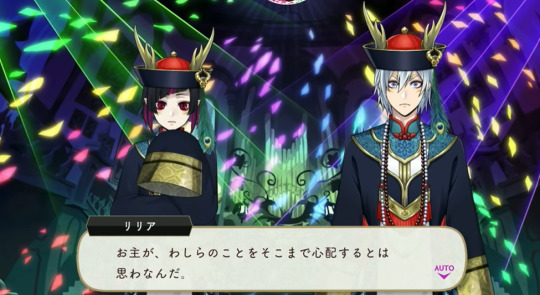
(I am aware they changed this line to “I didn’t think you’d be so worried about me” In TWST EN, but I’m just focusing on the JP version).
I just found it weird that even though Silver was very clearly worried about Lilia the most, Lilia kind of redirected Silver’s concern over from “Lilia” to “Lilia and everyone else”. Did it make him uncomfortable to hear Silver was that worried about him? I’m not sure, but it just stood out to me as being a little strange how he responded, and how surprised he was that his own son would get worried about him suddenly disappearing.
He didn’t think people would be happy getting pictures of him
At the end of Lilia’s Tamashina Mina vignette, Yuu stops by Diasomnia to give him some photos he’d taken of Lilia on their trip, and Sebek, Silver, and Malleus are delighted to see them, since it’s not often they get to see photos of Lilia. Lilia is surprised at how happy they are to receive those pictures of himself. But why wouldn’t they be happy? They love him and treasure him dearly, of course they’d be overjoyed to have pictures of him to remember him by. It’s like he thought they wouldn’t care about him that much, which is really bizarre, considering the whole “even if we’re not related by blood we’re still family” thing he told Malleus before.

Lilia: To think, you’d all be so delighted just to see some pictures of me. I never would’ve imagined you’d all react like this.
He didn’t think his departure in Book 7 would hurt those around him so much
This relates back to what I mentioned in the first point, but there’s one scene that demonstrates this perfectly.
After Silver breaks down in front of Malleus, Malleus teleports both of them to Lilia’s going away party. All eyes should have been on Malleus with how strangely he was acting, but the first thing Lilia honed in on was that Silver had been crying. And not only that, but Lilia looked surprised that Silver had been crying. And why wouldn’t he cry? The one person who formed Silver’s entire world and sun and stars was about to leave him and go die all by himself on the other side of the planet. There is no reason Lilia should’ve been surprised at Silver’s tears, yet he was. And I gather that’s because he never thought the boy could ever possibly want to choose to stay by his side, to choose him over all the hopes and dreams he’d burdened on the poor child from the moment he could walk, to choose him over his real friends and his real family members.
I hope when Lilia “wakes up” from his dream, the first he does is ask Silver what he’d been crying about back at the party. And I pray to god they will actually talk things out and Lilia will finally apologize for how much of a complete idiot he’s been acting.
My headache’s coming back so to wrap this up quickly, my current understanding of Lilia Vanrouge is that he either doesn’t realize just how loved and cherished he is by his family members, or that he does realize it and just pretends not to. If it’s the latter, which is what I personally lean towards, I think he does this as a means to protect himself.
He’s already lost so many of his loved ones, and he very well may be putting up these walls around his heart and pushing away the people who love him just so he doesn’t have to get hurt again. We don’t know how he became an orphan, but his birth family either gave him up or passed away and left him behind. Even when Queen Maleficia took him in, he was always made the scapegoat for the princess’s schemes, and it sounded like he was brought up more as Levan and Mallenoa’s inferior than their equal. And then war struck their nation. And then his one best friend went missing and the other one probably gave up her life trying to protect the very child who'd go on to shatter the ice surrounding his wounded heart.
Perhaps with Malleus and Silver and Sebek now, he thought his best option would be to exit their lives before they had a chance to do the same to him, because he knew they would do the same to him. Everyone does.
As a final note, I still keep going to back to what he said in Cater’s Halloween vignette. I think this one line sums up his views of love better than I ever could:
“But the more precious a bond is, the more pain it can inflict.”

(source)
#lilia vanrouge#twst silver#twst theory#twst#twisted wonderland#twst spoilers#twst analysis#not really a theory or anything more like its just me babbling but yeah
1K notes
·
View notes
Text
Is Azul Actually Kind?
I know how it sounds but pleaseee hear me out.
Azul isn't kind. That seems to be pretty obvious, right? His benevolence is clearly a facade, meant to hide the selfish, cunning nature lurking within.
I thought that too. But then I saw something that made me question it.
Namely, Azul's Platinum Suit Vignette, where he looks at the Sea Witch's actions regarding Ariel, and calls it 'tough love'.
He isn't talking about himself, he has no reason to fib. He even brings up his Grandma, making it pretty evident he's being sincere. He views the Sea Witch's actions - punishing deal breakers and setting people on them - tough love.
And the Sea Witch's actions are remarkably similar to his own. He makes deals, and he punishes people who can't fulfill them. But there are some very interesting things that, to be, combine with this to bring about the theory that deep down (or maybe not so deep down) he views it as an act of tough love.
1. Azul almost never harms his clients in a truly crippling manner. The one exception to this is the Prefect, but I feel that's easily explained by the fact that this was shortly before his overblot, and like other characters, Azul too was behaving in a manner worse than usual.
Other than that, though, his punishments are typically servitude, or giving up a talent. Keyword: a talent. Not the thing itself. Someone with a good voice who gives it up doesn't become voiceless, they just start sounding hoarse. This is proven during his backstory.
2. Azul comes from a place where 'survival of the fittest' reigns dominant. This is proven during book 6, where he mentions being hypervigilant and a risk of predators under the sea. This was also heavily implied by the twins.
To him, people who don't understand not to trust others likely seem misguided - especially considering his childhood.
3. Azul and Riddle have a lot of Parallels
This one is interesting. If you look closely, Azul and Riddle share many similarities: Sophomore Housewardens, Honors Students, completely broke down during their overblot rather than still concealing their emotions, tyrannical behavior over underlings, heavily implied eating disorders, incredibly hard-working despite their smug appearance, being short-tempered, the list goes on.
Riddle also truly believed that he was doing a service to the students of Heartslabyul by enforcing the rules the hard way. He likely viewed it as a form of tough love.
And so, Azul being kind in his own, odd way starts to make sense. It would give him another parallel to Riddle. And his 'survival of the fittest', bootstrap-pulling upbringing may be he doesn't actually find his actions that cruel, if anything, he genuinely may believe he's doing them a favor by teaching them early on not to trust others, to only make deals they know they can keep. And he's not exactly crippling them, so it's better him than someone who will.
So yeah, maybe Azul really does think he's being kind - at least, deep down.
Discourse, critique, and requests for proper citation are always welcome!
281 notes
·
View notes
Text
Analyzing the lullaby motif in book 7 (+translation of lyrics)
MAJOR SPOILERS for book 7 chapter 1-5
I hope everyone remembers the lullaby Malleus sang for everyone when he overblotted because that motif came back FOUR times in chapter 5 and I am going to analyze them all because they make me way too emotional 😭
Please feel free to find the lullaby motifs in this post and this post if necessary (although one of them is not included).
Translated lyrics of the lullaby:
A warm cradle
Starlight and joy
My eyes are watching over you still, let's be together
With no fear, even if we wake from this dream
Sleep, sleep, my beloved child
In dreams, I pray you would be guided to walk toward the light
(Analysis begins under the cut:)
The melody of the lullaby has been used 5 times at least in the story, they include:
When Malleus hummed it to everyone he put to sleep during his OB
When Meleanor sang it to Malleus
When Lilia sang it to Silver
When Malleus sang it to Silver
In the bgm when Sebek was helping come out of the darkness
The themes of this piece of music are love and farewell.
Motif use 2 is chronologically when the lullaby was first sung, it’s a song of love from a mother to her child when she knows they must part. I believe that when Meleanor sang this lullaby, she had already made up her mind to fight and let her guards escape with her child. She was taking the last moments she had with her child to name him "Malleus" and sing him this lullaby (7-75). Lyrics include sth like “I will be watching over you even if we wake up from this dream” and “may you be guided and walk towards the light”. But the beauty that comes with the theme of farewell is the theme of legacy. Because even though Meleanor is now gone, her song, and thus her love, never died.
Because Lilia remembers it. Motif 3 is Lilia singing it to Silver, and he’s also sung it to Malleus before. In a musical story, even if the characters lie or don’t have perfect information, the music never lies. Even if Lilia once doubted whether he could love Malleus and hatch him properly (7-77), and even if Lilia may still doubt whether he could love Silver, a human, properly (7-81), the motif symbolises love which tells us the truth — Lilia is capable of giving love. And the legacy is not just that Lilia passed the song to Malleus, it’s that Lilia internalized the song and sang it to his own son. He has seen what kind of mother Meleanor was, and he’s learnt from her kindness, her pride, her love and he has put that into how he raise his own child. Lilia has Meleanor’s legacy too.
And then to address the two Malleus motifs. First of all Malleus never sings it with lyrics, which would imply Malleus himself doesn’t fully know the true meaning of the song. However, he knows that he’s felt happiness and protection from hearing this song, so he sings it to Silver when Lilia asks him to as motif 4 (7-81). When he sang it to Silver he sounded confused, it must’ve been a long time since he’s heard the song. But he still remembers it, which means Meleanor’s love never died because Malleus remembers it all the same. It’s still in Malleus. It’s still there.
But when Malleus overblots, the song gets twisted a little bit (motif 1). However, in Malleus’s mind, it’s still a song of happiness and protection, because he overblotted trying to protect everyone’s happiness forever. But the music sounds creepy to show you the true nature of the song is not like this. The nature of the song is that "even though I cannot be with you always, I will still love you and wish for your happiness". This is the part that Malleus did not understand and did not cope with. It’s also interesting to note that Malleus sang motif 1 with a smile and no hesitation, he was completely confident and sure in what he was doing. Meanwhile, in all other three sung versions, each singer had their own different emotions in their singing, and those emotions were a lot softer, a lot less certain.
And the fifth and final use of the motif is used in the bgm when Sebek yells at Silver for him to get a grip (7-86). The song is arranged into a victorious piece with certainty and assurance. The use of the motif reminds us of the themes: love and legacy. It calls attention to these themes and entrenchs the truth that Silver IS Lilia’s legacy, and that’s only possible because of the love that Lilia has given him. The exact part where the bgm starts playing was when Silver said "Even in the darkness, I could always hear it. 'Stand up' 'Don't give in' 'Live'... it's father's voice. [...] All that he taught me, that's the proof that he had loved me. It's not a dream and not an illusion... it's true love." (I'm serious he really said "true love" for real this IS a translation T^T). When Silver saw Lilia's memories of the song, he denied the love, he said he should not deserve it. The motif had to come back because this is the moment when Silver can finally realize “Ah. This song is full of love and father sang it for me.” The motif HAD to come back because Silver has to come to accept it.
But the bgm arrangement is also made for Sebek. The bgm is full of certainty because Sebek has no doubts in what he’s telling Silver. Sebek, who has grown up alongside Silver, has witness all the love between Lilia and Silver. He KNOWS Lilia’s love is true and he’s conveying that to Silver with certainty. This bgm summarises what Sebek was doing so well, Sebek sees the love Lilia has for Silver and was literally blasting it in Silver’s ears.
As Disney's Sleeping Beauty (1959) puts it, "true love conquers all". And we've been shown that there's love in every direction among our Diasomnia found family. Let's hope that, soon enough, Silver and Sebek would wake Lilia up, and they can finally show Malleus the true meaning of his mother's lullaby and the wish she entrusted to it — that he would walk towards the light, even if she cannot be the one guiding him...
#twisted wonderland#twst#twst spoilers#twisted wonderland spoilers#twst ch 7 spoilers#twst chapter 7#lilia vanrouge#silver#twst silver#sebek zigvolt#malleus draconia#mallenoa draconia#meleanor draconia#twst book 7#twst translation#twst analysis#diasomnia
491 notes
·
View notes
Text
I once saw a post that was like: “wtf Octavinelle only wears simple suits while the rest of the dorms wear these beautiful complicated outfits that probably take hours to put on even with magic that’s so lazy”
Lemme tell you why Octavinelle wears suits and why it’s so impactful.
A suit implies work. It implies work ethic. It implies “Whoever and whatever this person works for, there’s an expectation to get things done, but in an efficient, presentable manner.”
Beyond that, a suit in a prestigious magic school implies “normalcy.” It says “This dorm and it’s students are still grounded in the reality of the everyday person, even those who don’t/can’t do magic.”
In comparison to the rest of the dorms, an Octavinelle’s uniform is familiar. Humble, intelligent, honest, and approachable.
It’s an angler fish’s lure.
Because while you’re busy admiring and relating to these fine, upstanding gentlemen, they’re tracing their tongues along their teeth. They have bodies in the freezer. Their pockets are lined with dirty money. They strangle throats, collect debts, they know where you sleep… but they have friends. And connections.
So they couldn’t possibly be bad.
To the unsuspecting small fry, an Octavinelle in a suit knows what he wants and he knows how to get it… so surely he can do the same for you.
How that happens doesn’t matter.
In the end, an Octavinelle will always be the embodiment of good business.
#twisted wonderland#twst#octavinelle#twst analysis#floyd leech#jade leech#azul ashengrotto#can you guess my favorite dorm#they’re so silly#they’re so dangerous#kisses their foreheads
494 notes
·
View notes
Text
Malleus Draconia and the Cognitive Dissonance of being a Lonely Prince
A character analysis exploring Malleus’ conflicting views of self
Malleus has two primary characteristics that are significant to his identity: (1) His role as a highly revered, feared, and praised mage & prince and (2) His loneliness and social/emotional isolation.
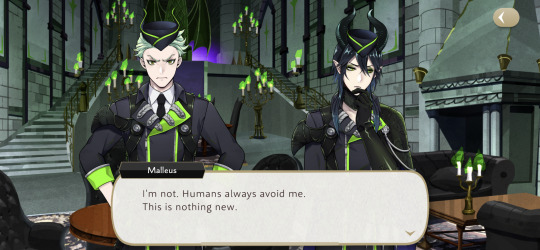
In Malleus’ concept of identity, these two characteristics are in conflict with each other, despite one somewhat being caused by the other. How can a person reconcile the fact that they are supposedly extraordinarily special, talented, attractive (this is canon in universe btw lol), intelligent, beyond powerful, etc. - essentially a perfect prince - with the fact that they have no friends and barely anyone who cares about them (excluding those he feels are obligated to care)?
Malleus has no strong emotional connection with anyone that is not his family (I include Lilia in this category) or one of his guards (who, in spite of Sebek’s protests, is basically obligated - socially or role wise - to respect and love him). Now, I don’t think any of these relationships is obligatory or disingenuous in any way. Lilia, Silver, and Sebek all genuinely love and care for Malleus. However, I’d argue that isn’t how Malleus sees it (I’ll get into this later).
First, I wanna go into the first characteristic I mentioned, him being revered (+feared) because of his status and capabilities.
Before I even get into him as an individual, let’s look at how Malleus himself perceives the mere status of royalty:

Malleus believes (I suppose because of his personal circumstances) that people who are royalty inherently deserve respect. He even extends this to Leona, who he has a (playfully?) hostile relationship with. I don’t think there’s canon indication that this necessarily means he looks down on people of non-noble birth or anything, but he’s still stuck on this idea that, in certain respects, royalty does deserve better than the average person.
Clearly, this would extend to himself as well. Part of his self-image is kind of decided from birth (in an interesting parallel to Leona who believes that his own status as a second son decides his fate from birth) because he is raised in this environment where he is constantly told that he is better than others, simply because he is a prince.
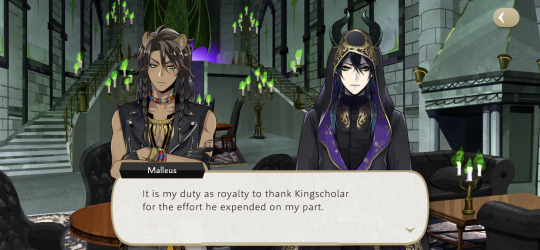
That said, Malleus takes being royalty and a leader very seriously. I’d argue he believes that because he is ‘better’ than others, he has certain responsibilities and duties that he must complete, as shown above.
Part of this also means that Malleus takes himself very seriously - he isn’t allowed to even try to be normal, because he always has to keep himself in check. Anything he does will reflect poorly upon himself and his family, and this is something Lilia reminds him of.
Here’s where I’ll talk about Malleus’ relationships with the rest of Diasomnia.
Now, Lilia is clearly the person who treats him the most casually and normally. He knows Malleus very well, to the point where he can read his emotions - namely his jealously/bitterness/frustration after being left out of something.
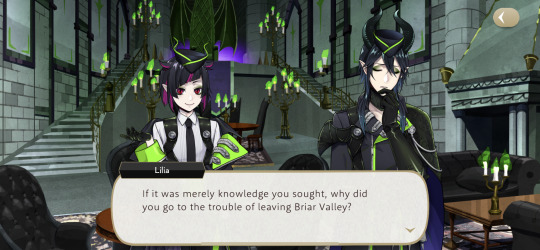
Lilia encourages Malleus the most to try and have normal experiences. He understands Malleus’ loneliness, and wants him to make friends - to seek out more than he could have all alone in his castle. But, Lilia also has times where he acts as more than a mere guardian to Malleus. I can’t find the screenshot, but I remember Lilia reminding Malleus about what behaviour is and is not befitting of an heir, so that aspect of their relationship is still something to take note of. Even Lilia, who understands him better than anyone, still must wish for him to be the best heir and prince (sometimes sacrificing his own wants, although Lilia probably does this the least considering he knows Malleus’ feelings).
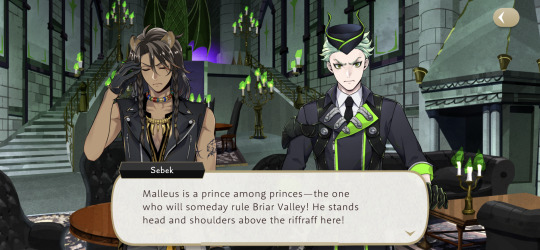
It’s no exaggeration to say that Sebek worships Malleus to the highest extent (just look at the portrait of him in his room). The way Sebek talks about him isn’t at all like a friend or even family - Malleus is a god to him. I argue that Sebek’s behaviour specifically (he would cry if he knew this) distances him the most from Malleus emotionally.
This will be explored more later on, but what Malleus wants is to be treated somewhat normally, at least by a few people he can be close with. Sebek does the opposite of this. While the students who are scared of Malleus isolate him because of their fear, Sebek actually accidentally isolates him because of his dedication and worship. Thus, both Sebek and others isolate Malleus through their treatment of him because of his position/status/strength.
Malleus certainly cares for Sebek, but I don’t believe he thinks of him as a genuine friend (and that’s not meant as a way to dismiss the relationship they do have, just that he doesn’t view Sebek as caring about him as a person rather than him as a prince/mage). How can he, when Sebek constantly acts like a fanboy around him?
Now let’s look at Malleus and Silver.
Silver addresses Malleus as either ‘housewarden’ or ‘master.’ Again, to my previous point about Sebek, I think this does point to Silver and Malleus’ relationship not exactly being a friendship. However, I think differently to Sebek, Silver does have more of a personal relationship with Malleus.

He treats Malleus with respect and formality, but he isn’t over the top with it. I’d argue they have a sort of ‘mentor-student’ relationship in a way; not exactly that, but you understand my point. Silver looks up to Malleus as a person, and Malleus is willing to teach Silver about things. I almost want to say they’re a bit like a younger and older sibling, but I think a bit of the closeness/familiarity is lacking (at least for now). The relationship still has a bit of a formality to it, but that doesn’t mean it isn’t personal. I won’t spoil for those who haven’t read book 7, but I think their relationship becomes more clear there, iykyk.
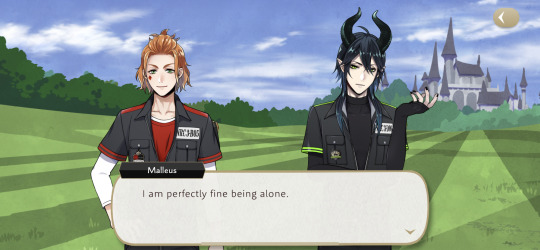
I know most of Malleus’ vignettes are played for a joke, but holy shit they make me sad. You can tell that ever since he enrolled, if he wasn’t sharing a class with Lilia, Malleus has basically had to work alone for everything. Even here, Cater is only asking Mal if he wants to join his group so he can use Malleus for Magicam clout. Everyone is so scared of him that he’s never had a partner and he’s even gotten used to it. It might not seem that serious, but honestly - sorry to be crude - this kind of thing does fuck you up, especially while growing up.
Think about how Malleus feels - being the outcast and genuinely having no friends feels humiliating and depressing. It makes you think there’s something wrong with you, and that’s the way I choose to interpret the other aspect of his character. His passive acceptance to social isolation and rejection is a constant among his vignettes - anytime someone brings this up, he’ll say it’s fine and he’s used to it.

Another relationship worth noting is Malleus’ grandmother - his only living blood relative. Something that stood out to me (and I could be reading too much into this) but Malleus really feels surprised that his grandmother would take time to write her only family member a happy birthday letter?
That’s very sad to me, and I think it’s a reflection of both the expectation Malleus feels is placed on them as royals and his feeling that he as an individual (not as a prince) is inherently less important than any royals duties. He seems to think this way about himself too, treating his princely duties as always more important than anything he would want personally. A letter is a small gesture, and Malleus doesn’t even expect that from his grandmother.
I’ll use this to segue to discussing Malleus’ insecurity and social isolation.
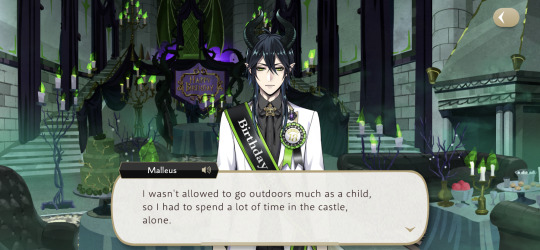
Ever since he was a child, Malleus has been isolated from others. Before he was feared and before he was worshiped, Malleus was lonely. That’s clear to anyone. Now, I want to talk about how this loneliness and isolation has affected his self-image.
Examining his personal relationships, how the rest of the school sees him, and his own views on royalty and himself, I think it’s clear Malleus, on one regard, seems at first glance to think highly of himself. He isn’t arrogant or boastful. Rather, he just is very extraordinary in many aspects.
But, that surface level interpretation completely leaves out the other side of him. While he might excel in skills, Malleus fails on all regards in terms of relationships. It’s clear, no matter how much he says he doesn’t care or that he’s accepted it, that it hurts Malleus every time he is excluded from something.
He tries to hide that he’s upset that he missed the orientation ceremony, but Lilia remarks that it’s clear how jealous he is that Sebek got to attend. When Lilia reminds him that there’s always next year, Malleus immediately dismisses the possibility that he will ever be invited. In his birthday vignette, he states that he hates eating entire cakes and becomes upset when Yuu brings up the fact that they aren’t meant to be eaten alone because he knows. He knows just how lonely and isolated he is compared to everyone else and he hates.
Malleus has mostly given up and accepted that he will ever fit in. He is pessimistic, but to say he does not hope isn’t entirely correct. Later in the vignette, although he may be half-joking, Malleus remarks that Leona may have stopped by to invite him to a party - he’s even excited by the prospect. And again, he is let down. Leona even taunts him spot-on for his greatest insecurity (isn’t he just so dreamy?).
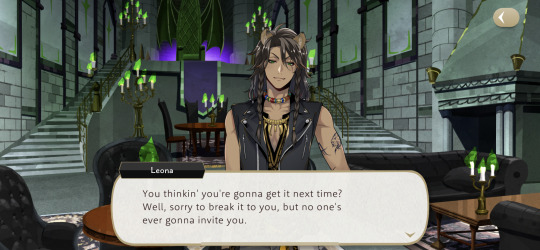
Now, while this does offend Malleus to a degree (see their catfight where he basically threatens to declaw Leona), I get the feeling that this kind of interaction with someone who views him as an equal (or at least, isn’t intimidated nor awed by him in the slightest) is probably pretty refreshing for Malleus. In a way, you get the sense that he enjoys that back and forth with him, because this goes back to Mal’s wish to be accepted and have friends to talk with.
Anyway, to return to my main point: Malleus’ deep loneliness and failure to fit in has likely caused some deep rooted feelings of insecurity (Note: I want to make a separate post on this because it’s kind of a lot, but I think this also contributes to his anxious attachment style). Malleus likely feels unwanted, despite all the great things about him that make people like Sebek fanboy over him.
No matter how powerful Malleus becomes, no matter how many people worship him, Malleus will always feel worthless deep down because no one will accept him for who he is.
The kind of insecurity and loneliness that pervades your life for years and follows you around everywhere isn’t something you can just shake off. No matter how much he tries to reassure himself that he is enough, he’ll never quite be able to quiet the voice in his head telling him that he is wanted by nobody and that he deserves nothing, that things are this way because he is not worth loving.
To conclude, how can Malleus reconcile these two sides of himself - the parts that know he is something great (worthy of worship and praise, even) and the parts that tell him he is worth nothing? Both sides are so extreme, people worship him but almost everyone avoids him. I feel that’s something Malleus must struggle with a lot - trying to hold on to the view of himself as a good prince while feeling that slip away when he becomes emotional.
Thanks for reading if you got this far! Let me know if you disagree or think I got anything wrong, this is just my thoughts and my opinions and I’m open to changing them :)
#malleus draconia#twst malleus#lilia vanrouge#sebek zigvolt#twst silver#twst analysis#twst character analysis#twst#twisted wonderland#k. character analysis
789 notes
·
View notes
Text
Analysis of Crowley and Malleus’ Voice: “I heard Levan’s voice”
When OB! Malleus broke into Lilia’s dream, the very first thing that Lilia says is that he has Levan’s voice, but looks like Meleanor. General Lilia was not one to mince words; and considering how close of a companion he was to Levan, we can take this as a fact that Malleus sounds like Levan. Plus, it was just his immediate first reaction without hesitation (*⁰▿⁰*)
So being the silly Crowley/Levan truther that I am haha, I compiled several clips of OB! \(//∇//)\Malleus and Crowley speaking. I think a lot of people miss just how fluid Crowley’s voice is. Miyamoto Mitsuru (Crowley’s voice actor) depicts a large range for Crowley, from high-pitched and whiny, to deep and ominous. Crowley hardly ever speaks in his deep tone- with these clips that I gathered being majority of the rare occasions that he does. This deep tone is different from the stern one he uses in serious situations (e.g when he got taken away from STYX) or scolding the students. So it feels purposefully special.
And since Crowley speaks in this rare deep tone when speaking to the mirror in the prologue, I assume that it’s closer to his natural voice, as he is not putting up any performances for anyone. He notably speaks in this deep voice when talking about mirrors. The Culinary Crucible one was more of a bonus, as he is being purposefully dramatic, but I put it in to show that Crowley can comfortably speak in the this deeper tone.
Levan is currently a wildcard. Levan could just be a new character! However, I feel like Crowley’s deep tone is the closest voice to Malleus so far, and I am intrigued if this is indeed purposeful 👀🐦⬛🐦⬛🐦⬛🐦⬛ Since Levan was described as “kind” once again (using the same exact word that Crowley constantly uses to describe himself in Japanese), I feel like almost every hint we get about Levan is…something to keep in mind \\\\٩( 'ω' )و ////
#forgive my poor video editing skills lmaoo#twisted wonderland#twst#twst theory#twst analysis#twst book 7#twst book 7 spoilers#twst spoilers#twst papa draconia#twst levan#Twst revan#twst malleus#twst malleus draconia#malleus draconia#twst dire crowley#twst Crowley#dire crowley#kallistopost
502 notes
·
View notes
Text
the elitism in magic education


HELLO 🤡 I have come to you today with an analysis of Fellow Honest's motives and what they imply about the mages and non-mages in the world of Twisted Wonderland, as well as the state of magic education as it relates to one's social status.
It's a doozy, so let's get right into it!
***WARNING: Spoilers for Stage in Playful Land!!***
Fellow's resentment of the elite harkens back to something I've always suspected but also something that Twisted Wonderland has seldom gone out of its way to shine a harsh spotlight on. That "something" is the discrepancy between the "haves" and the "have-nots" in terms of magic. With the main setting of TWST being a private magic school, of course the lens through which we view many events will be from this perspective as well... and that limits what we see and hear. Most of the NPCs we encounter (even the annoying ones, such as the Magicam Monsters from the first Halloween event) endlessly praise the NRC students just for attending a famous magic school. If we look closely though, we’ll start to see cracks in the shiny rose-colored lenses (which, coincidentally, is how Fellow’s UM name is written).
To begin with, we are told that only 10% of the human population (for the sake of argument, let's assume that most other races also have low magic rates) is even capable of magic to begin with. Of this 10%, the majority of people with the aptitude for magic only have enough to barely be able to lift a cup. In order to qualify for a prestigious magic school like Night Raven College or Royal Sword Academy, you'd literally have to be the cream of the crop and get lucky in terms of genetics. Magic cannot be learned by someone that was not born with the innate ability for it, and not everyone who is the child of a mage will be capable of magic themselves. This is already one HUGE barrier for entry. We now have more to consider.
Night Raven College is notably a private boarding school. This potentially means that students may need to pay a tuition fee for classes, room, and board. Perhaps this tuition doesn't exist, since NRC doesn't take applications but rather hand-selects its students. Additionally, NRC is based on a British school, and most European schools cost little to nothing to attend. However, it's hard to believe a school as fancy as NRC is a private institution that runs solely on the charity and goodwill of donors (though we do see Crowley happily accepting donations as well, specifically from the local town and from Kalim’s family). Realistically speaking, Stuff Costs Money, and if you Want Stuff, you also Need Money. NRC is not raising these mages of the future out of the goodness of their hearts, NRC is raising these mages because there is profit and prestige to be gained from the endeavor. What if there are students who are picked to go but end up having to leave because they can’t afford it?? This point is just speculative though; I won’t count it as actual evidence since there is no in-game lore which confirms tuition. We do know, however, that students do at least have to pay for their dorm uniforms, as Ruggie has mentioned he could not afford one—hence why he wears a hand/me-down from Leona. We also know students are on their own when it comes to paying for their food, as both Ruggie and Deuce mention being low on cash in reference to buying meals/snacks. Buuuuut even if we discount that money is a factor that gatekeeps some selected students from attending or having the cash to just get by on a daily basis, what we cannot ignore is that money inherently puts some people ahead of others before magic schools even recruit them.
Because the majority of those in Twisted Wonderland are incapable of using magic, magic is not typically included in general education. This means that if your kid manifests magic and you want them to be "ahead of the curve", you'd need to seek out resources for magic training and education. Now, this could mean reading materials, private tutoring, or reaching out to mages you know of. The problem with all of these things is that they tend to require money and/or connections, which are things not everyone has access to. Idia even says in book 6 that Riddle has an “artificially large” pool of magic due to how young Riddle started his magic training, meaning that the wealthy has the resources to just produce “better” mages. The rich also have more money to throw into items to help with magical training, such as bigger and better magestones (which must sell for substantial amount in the first place since Ruggie tries to save some to pawn off later in Vargas Camp) to keep mages healthier for longer (since magestones help absorb blot). This keeps power concentrated in an already elevated class. (Note: research has shown that money opens up and expands one's connections, which still puts the rich in an advantageous position compared to the less fortunate. There are also studies that show impoverished people who happen to have rich friends have a better chance of raising their own social standing just because of the doors and connections that rich friend can open for them.) Look at who in the main cast remarks on having formal magic training: literal royalty like Leona and the upper middle class like Riddle. Again, one could say that because schools like NRC appear to hand-pick students regardless of how much formal magic training they had prior to enrollment. However, the fact remains that it simply looks better to potential recruiters (using this blanket term because we don't know how magic schools besides NRC gets its students) and better prepares the child for magic school curriculum to get an early start on it.
Looking back at the 22 boys that make up the main cast, close to three-quarters or ~75% of them come from at least upper middle-class backgrounds and quite a few could classify as wealthy:
Riddle's parents are both doctors, with Riddle's mom in particular being well-known and well-regarded in their home community.
Cater's dad is a banker; his position is high enough up that he needs to relocate every so often (presumably to service their largest or most important firms).
Leona is a literal prince. Even if he isn't destined to be king, he still has access to the resources and wealth avaliable to a royal.
Azul's mom owns the most popular restaurant in the entire Coral Sea (have you seen how large the Coral Sea is on the world map???), and his stepdad is a lawyer.
The twins' family is said to be well-off; they are able to afford luxuries like fancy clothes and Mr. Leech stresses the importance of manners and presentation. He is implied to have business associates who are also well-off and would like to get in his good graces. (Popular fan speculation is that the Leeches are a crime family.)
Kalim is the heir to a massive family fortune and trading business. He also has relatives who are royals.
Jamil, as Kalim's attendant, is also from a reasonably well-off family; they are compensated handsomely for handling the Asims.
Vil's father is an A-list celebrity, and Vil is also one himself.
We don't know the specifics of what Rook's family does, but it must be well-paying, as we learn in book 5 that the Hunts have villas all over Twisted Wonderland, as well as permissions for international travel via warp pads.
Idia and Ortho's family run a secret organization that researches blot. S.T.Y.X. is so secretive that basically only those in super high positions like Crowley and Leona would know about them. Let's also not forget that the Shrouds have ties to the Jupiter Conglomerate and the Olympus Corp, which is a tech giant in the world of TWST.
Malleus is prince AND the heir to his kingdom’s throne. He is also one of the top 5 most powerful mages in the entire WORLD.
Lilia is a renown war general and a close friend of royalty. He raised a young Malleus as well.
Silver is Lilia's adopted son and is actually a prince himself.
Sebek's parents are dentists. They must make mad money. His grandfather is also a respected knight that served alongside Lilia.
Notice how all the dorm leaders are upper middle class or higher; the vice dorm leaders have ONE normal person (Trey); in Playful Land, Trey confesses to living a comfortable life so we know he must be at least middle class.
We can try to argue all we like that NRC doesn't discriminate based on social status for their selections, but if that's the case then why are so few of the main cast from impoverished or low-income families? Only Ace, Trey, and Jack count as squarely middle class. Ruggie is the only example we have of someone from a very low socioeconomic status rising up to be among "elites". The other example is Deuce, who comes from a single parent household and has implied they don't have a lot of money (for example: how the VDC/SDC earnings will help out his family). (Epel is kind of a ??? case because depending on where in the story you are, his family could be in financial trouble or not; in book 5, they imply his entire village is having difficulties selling product until Vil promotes Harveston apples on his Magicam.) Maybe it's unfair to say that 22 students out of 800ish is representative of the makeup of the entire NRC student population (or represents the composition of all magic schools), but the single digit representation of low-income students is also true of real-life elite schools. They are private schools for a reason; it naturally gatekeeps who is and isn't "allowed" to attend, leading to the majority of its students being members of the elite.
Another thing to consider is legacy students. This term refers to the increased likelihood of people being accepted into a school if they had a relative that also attended that school. We know of two instances of this happening: Ace's brother and Sebek's brother also went to and graduated from Night Raven College. Ace even makes a remark during his sorting ceremony that he ended up in the same dorm as his older brother "as expected". If magic aptitude is genetic, then perhaps it makes sense to recruit from the same families--but again, this is inherently restrictive, as you would continuously be culling from the same pools generation after generation.
Back on the topic of bloodlines and family, what about Kalim, who has an extensive family? There will be no shortage of Asim mages going to NRC just because of legacy (Jamil even alludes to the fact that the previous Scarabia dorm leader was an Asim relative, and his recommendation is what got Kalim the dorm leader seat). And speaking of Kalim, consider instances where rich families are able to bribe faculty (lookin' at YOU, Crowley) or donate a large sum to get their kid ahead or to be given priority over others that may be more qualified than them (RIP Jamil). To continue off that point, NRC itself is structured as a "dog eat dog" world. Those with inherently more magical ability have the right to trump over others. You can duel and lose your dorm seat to a more powerful mage, even if you trump them in terms of merit or leadership qualities. Students feel a sense of duty to obey those who have bested them in battle (ie Epel's servitude to Vil). Everyone fears Malleus. Your magical power is respected above all else.
Attitudes surrounding magic have notably shifted from fear of it several hundreds of years ago (around the human-fae war, back when “witch” and “wizard” were used in a derogatory sense) to recognizing it for its strengths and actively seeking it or granting some favoritism to those who have it. There is, in fact, now class discrimination in based on whether or not you can use magic. We got an early instance of this as early as book 1 of the main story, when Riddle insults Yuu for their upbringing, lack of education, and their inability to use magic. It’s something that clearly rubs Ace, who has a magicless father, the wrong way, and he stands up for Yuu. There are other subtle hints about this divide sprinkled throughout the lore. For example, Ruggie has a voice line which he indicates that the slums where he comes from doesn’t produce many magic users. Again, recall that magic runs in bloodlines. This could potentially allude to a past where those without magic were forced into lower income neighborhoods, which results in pockets like Ruggie’s hometown with a high population of magicless individuals living in poverty. This doesn’t appear to be a large scale issue (perhaps its only an isolated case?), but this is worth paying attention to.
This could all translate into the professional world too. Some jobs are entirely locked behind magic (ie you just cannot do them or pursue them if you don't have the magical ability for it). Some jobs DO require magic (ie medical mages like Riddle's parents, magic police force officers, technomantic inventors, etc) and probably additional training that goes with it. As a result, I'd imagine that these magic-intensive jobs pay quite a bit more. There may also be overall more job opportunities for those capable of magic, since magic is so much more efficient than doing things by hand. It means more retention of wealth and/or more upward mobility for the few impoverished that are able to enter magic schools. (This is, of course, not including the few and far between cases of regular people who get rich in select industries, such as Kalim’s father.) Recall too that NRC requires its students to take internships during their 4th years, many placements being with very prestigious groups and organizations such as pro-sports teams, labs, tech giants, etc. Being able to attend a prestigious school with connections grants those elite students even more opportunities than the average person.
Then think about what this means for people who fall short of these standards that these magic schools set. We actually have examples of them in book 5 of the main story: when Deuce and Epel are reconciling on the beach, a bunch of delinquents from another school come along and start checking out Deuce’s borrowed magical wheel. Through the NPCs’ exchange, we learn that one of them has enough magic to power a magical wheel, but not enough to do much else. This NPC also couldn’t keep up in class and dropped out of a magic school. He then becomes insulted when Deuce implies he is “a beginner”, so this is obviously a very sore spot for him. Riddle also has dialogue that implies students dropped out of NRC prior to his reign (and since then, no Heartslabyul students have left). Additionally, consider how magic can be used to oppress and lord power over others. Deuce himself is guilty for summoning cauldrons to crush rival delinquents in fights back in Clock Town—even if those delinquents lacked magic themselves. Similarly, Epel is implied to use magic to gain an upper hand against those that bullied him back home. This all implies a social divide between those with magic and those without, and begs of bigger questions.
What happens to the ones that don’t make it? The ones that get left behind? The ones without the magic to make it “big”? This is the root of Fellow’s anger; he’s mad at a system that cast people like him (someone with very little magic) and Gidel (a non-mage) aside. They don’t get the opportunity to make better futures for themselves. They’re looked down on by high-up institutions that basically tell them they’re not good enough.
Knowing all of this, the deck appears to be stacked against the poor and non-mages. It’s no wonder why Fellow is so mad.
THIS ACTUALLY RELATES BACK TO WHAT ROLLO SAID IN 5-2 OF GLORIOUS MASQUERADE… "When you have too little [magic], you're resentful. And when you have plenty [of magic], you're arrogant. You can never content yourselves." The NRC boys are arrogant (this is the side of the story we’ve always known due to seeing the world mainly from their perspective). They are the “haves”, and we see them constantly misusing their power by fighting each other over very petty things (even if it’s against the rules to do so). But everyone else??? They’re scrounging for the scraps. Fellow falls into that former category; he IS the guy that’s resentful because of his lack of magic and how something he cannot control has already determined where he and Gidel will stand in life no matter how hard they work. They can never hope to rise out of poverty, and there’s nothing they can do about it. That must be soul-crushing.
When Fellow praises the NRC boys in that overly exaggerated way, he’s obviously being shady and facetious—however, there is also a kernel of truth behind this behavior. Most other NPCs we’ve met have spoken about the NRC boys favorably just because of their affiliation with a prestigious school. It’s the same way people might be impressed if you walked around in an Ivy League branded hoodie or something. People automatically associate you with the school’s shiny and exclusive reputation, and thus assume you are also intelligent, talented, etc. Then, in the same way being constantly put on a pedestal like this might result in the students getting swelled heads, this only further feeds into the NRC kids’ egos. They so privileged they don’t even recognize it. And that makes Fellow fucking FUME.
Look back at Fellow's dialogue. He is constantly mentioning the prestige of the school the boys go to, or adding on extra compliments about their status and skills. He's ass-kissing to his boss, who is also wealthy or part of the upper class, then insults the boss once he hangs up. Fellow is always in a position where he HAS to be subservient to the upper class in order to make his money and get by, and he finds that entirely unfair. Imagine having to simper and placate people you absolutely despise and blame for your problems every day, people who are gorging themselves on luxuries, coasting by in life, taking everything they have for granted while you get by on pennies—that has to get frustrating.
I want to briefly mention here that, in addition to praising the NRC students to high heaven, Fellow also talks down his own skills. He cheerfully calls himself a loser and says that no matter how much he trains, he could never reach their caliber of magic. Yes, Fellow is exaggerating to get the kids to think they’ve won, but I also have to wonder if he’s parroting the same phrases he was told long ago, from people who doubted him and never thought he’d make it. If that’s the case, then I get the sense that Fellow is in a way “reclaiming” his autonomy and power by adopting those same cruel words and using them as a strength. He admits to being “weak” but is also proud of the fact that he can utilize his magic along with his natural charisma to get a leg up over others. It further fuels his new belief that going to an elite school doesn’t matter, it’s practical skills that will serve you well.
Okay, back to talking about his shitty work situation! Fellow’s employer clearly doesn’t treat him with decency. They berate him, make unreasonable demands, act impatient, etc. They are a typical depiction of a toxic workplace and boss. This can also be read as shorthand for the relation between the rich and the poor, and how that may have shaped (or worsened) Fellow’s views on others of the privileged class. He makes many assumptions about the NRC students without really getting to know them, calling them entitled brats. Why? Because these descriptors likely apply to the higher-ups Fellow has always slaved away for. This, in combination with his own experiences in being rejected from magic academia, has created a person who feels trodden on by society and by the upper echelons who run it and benefit off the system.
Fellow himself is the perfect example of someone who was failed by said system. He has dialogue stating that he was never given the chance to learn because his magic was not considered strong enough. Still, he tried to make an effort to earn that chance among to elites and to study among them. Fellow was rejected, ridiculed, and told he had “forgotten his place”, what he had been born into. There were expectations he couldn’t meet, and so Fellow was thrown away like a broken toy. He has failed not because he didn’t try, but because he was denied the opportunity to begin with. This is where is rage stems from. Fellow despises the students of those same kinds of institutions who kicked him down, students who don’t realize how fortunate they are for their educations and will likely continue to perpetuate the system.
What, then, does that means for his signature spell, which is closely tied to one’s identity? Let’s take a magnifying glass to it. As previously mentioned, the name for Fellow’s spell is written as “Rose-Tinted Dream”, but it is said out loud as “Life is Fun”. The chant for it is, “Come on to the theater” (notably said in English rather than in Japanese). Both the spell and the incantation are references to the song Honest John sings in Pinocchio, Hi- Diddle-Dee-Dee. And… well, the whole UM in of itself is one big cruel joke given his circumstances now.
I think this spell is representative of a young Fellow still full of hopes and dreams, looking forward to studying at a magic school. But then those dreams are shattered and he has to commit terrible crimes to survive day-to-day, and he seems to have given up on his dreams. He even goes so far as to protect Gidel from having the same hopes he once did, telling Yuu to not put silly ideas in his head when Gidel expressed curiosity about school. At the same time, he delights in crushing the hopes of those he deems his enemies (stating that he wanted to betray Kalim to “teach him a lesson” about how cruel the world is). Fellow knows the truth: that life isn’t fun, that it will disappoint you and will put you down. His actions are very cowardly as well—he uses tricks and deception, he runs away from his problems instead of properly addressing them, the NRC students remark on his lack of pride. Fellow has had to throw away so much to scrape by. Yet his UM symbolizes someone brimming with hope—so perhaps it’s a UM he manifested when Fellow still thought he had a chance?? And then people made fun of him for it being so weak?? Alternatively, maybe he didn’t get his UM until after his dreams were crushed so he’s looking back on those nostalgic days of blissful ignorance with rose-colored lenses (which is, again, maybe why his UM magic name is written as “Rose Tinted Dream”). A UM that is a reflection of one’s true self, yet that same identity is one that has been forced to be discarded. That’s the reason why, despite all the swindling and scamming, I don’t think Fellow’s enthusiasm for fun is a lie. That’s the one “real” part of him, but even that’s been repurposed to help him live on scraps, something innocent twisted 😭 and that’s really sad to think about…
But also??? You could argue that Fellow still has a little bit of that lost inner child and hope left in him. He tries to defend Gidel’s understanding of the world and has goals of starting his own school despite how poorly he originally spoke about these institutions. (So Fellow does appear to care about children and their futures.) He also has a childish streak despite being an adult, demonstrated by his use of cowardly tactics, taunting kids, and abruptly quitting his job to then destroy his workplace. Fellow himself states that he “just tries to live a free and fun life”, thus his pursuit of money and pleasure. This could all play into being what defines Fellow and thus his UM. It embodies a spirit of playfulness even when he has been crushed under the weight of an unglamorous life.
I’ve heard people saying that while Rollo is Idia’s dark mirror and Fellow is Ruggie’s. They have similar backstories but ultimately their fates are different and left the former two down far more sinister paths. Just as Rollo is an Idia that turned his anger outward instead of inward, Fellow is Ruggie had he not been given a chance to receive an education to elevate his social status and job prospects. Fellow and Ruggie both cling to rich, powerful benefactors/bosses and do their dirty work to get on by—a big difference is that Leona, while he does also work Ruggie to the bone, also has some conscience. Something else to consider is that while Ruggie prioritizes making a life for himself by studying and securing a stable, well-paying job, Fellow is focused moreso on the accumulation of wealth itself (as he suggests to Kalim he’ll take a bribe to let him go free and quits when there is no longer money to be gained from his boss). Both don’t really care how they get their money (even if it is by dirty means), but ultimately Ruggie’s way of making cash is more sustainable in the long run. Yet Fellow ultimately realizes the importance of school deep down despite constantly denying it when the NRC students tell him of it. Fellow is in denial because that’s the only way he can cope and justify his lifestyle. He’s confused when finally confronted with students who are his ideal of “happy and free”, even when they’re in an educational system that he views as shackling people into strict roles. The way he laments about not being able to go to school is also very reminiscent of an adult mourning a lost or unfulfilling childhood, which is quite a depressing scenario…
Fellow is the one that got the short end of the stick in life. Ruggie met Leona, and Leona technically uplifted him in his endeavors, tutored him into getting decent grades and giving him hand-me-downs and money in exchange for his services. Fellow never had that kind of support system, he was just insulted and bullied into giving up and had to find an alternative way to keep himself going 😔
Personally, I think Fellow could also be a dark mirror to Kalim, no?? They exist on opposite ends of a social spectrum. Kalim has everything and Fellow had nothing. What’s more, Kalim is still wide-eyed and trusting. He is the only one willing to try words instead of fighting him and instantly labeling him as the enemy. Meanwhile, Fellow has become bitter because of how the world has betrayed him. He wants to take that trust Kalim has and show him how cruel everything truly is. Why is he fixated on that? Why even offer in the first place if he never intended on going through with it? Why does he want to rub it in Kalim’s face in particular? Maybe it’s because Kalim seems rich and dumb, as Fellow claims, but maybe it’s because there is envy there. Sure, Fellow is upset about Kalim being a sheltered brat that faces no challenges in life, but I also feel like he’s jealous that Kalim can still afford to think this way. That he can still afford to be cheerful, that he can still be a dreamer. Fellow was alluded to be like that once—but he can’t be like that anymore, not when he has to look out for himself and Gidel.
Side note, another comparison! Recall that Kalim’s Oasis Maker is also a UM that uses a little bit of magic. However, Kalim does not know of many creative ways to use his spell, as there is no real reason to since his home country has lots of canals and irrigation. He therefore deems his UM as pretty useless. Fellow meanwhile has what most consider a weak UM but he fully utilizes it to his advantage and pairs it well with his natural charm to maximize its effects. He had to develop these skills because he was in pressing circumstances in which they would benefit him. This contributes to the “mirror” theme between the two.
Fellow and Kalim have a notable similarity as well, and this is where I feel they can connect. They are both older brothers to a child or children who are magicless. Fellow only has one, and Kalim has many—but the number here isn’t what is important. What is important is that Fellow and Kalim think the world of their siblings and want to support them. To that end, Fellow is willing to be cruel and step on others, and Kalim is all sunshine to keep their spirits up. Fellow has suffered through great poverty and insults and Kalim has survived so many attempts on his life, yet they’ve developed distinctly different approaches to the worlds that have embraced them. Kalim’s wealth could afford him protection and luxuries, so he’s able to live carefree with others tending to his needs. The same isn’t true for Fellow, and so he came out far more spiteful and resentful.
Thinking about it, it’s ultimately Kalim’s words that convince Fellow to turn on his employer. (The other boys certainly wore Fellow down and planted the seeds of doubt, but it’s Kalim that I believe fully resonates with Fellow.) He can so happily talk about why he loves school, even though he doesn’t do well at it (something I presume is also true of Fellow, since he is lacking in tons of magic). It’s not said in a particularly articulate manner, but it’s so candid in its presentation. Kalim is relating to him based on similar skillset (or lack thereof) and sharing fond memories of his time at school, reviving the hopeful “lost child” in Fellow. Kalim is probably the first wealthy person in a long time that was friendly, kind, and supportive to him. And here he is, reassuring Fellow his dreams are still possible, to not give up. That’s the final nail that allows Fellow to be “honest” with himself and his inner child. It’s what leads to that slew of irresponsible actions at the end of the event (letting people free, blasting the amusement park, driving a sinking ship, etc.).
At the end of Stage in Playful Land, we see that Fellow never really let that childlike side of him fully die. (It seems to have been concealed under a desire for money and appeasing his boss.) He shares his dream of creating his own great school to give educational opportunities to non-mages and mages with low magical reserves like Gidel and himself, a school that teaches practical life lessons. He wants to promote his own ideals and to change the system he hates from the inside out. This was never communicated to us before most likely because Fellow had renounced those ideas in favor of blind hatred and a lack of faith in the world and those that dominate it.
Fellow also acknowledges that life may be even more difficult for him and Gidel going forward, as now they lack the money for even food and no longer have jobs. Furthermore, they need to worry about their ex-employers coming after them for what they’ve done. Even so, Fellow faces it all with a smile and reassures everyone that they can transfer or visit to play… “on this shining stage called life”. He and Gidel are able to walk away with their whimsy preserved, and can still be that which they’ve always wanted to be: dreamers.
All of this is to say that Rollo was right all along about magic, he never misses—
#twst#twisted wonderland#Fellow Honest#twisted wonderland analysis#twisted wonderland character analysis#twst analysis#twst character analysis#Ferro Honest#Rollo Flamme#Gidel#Gidell#disney twisted wonderland#notes from the writing raven#spoilers#Dire Crowley#Heartslabyul#Savanaclaw#Octavinelle#Scarabia#Pomefiore#Ignihyde#Diasomnia#Yuu#Ruggie Bucchi#Kalim Al-Asim#Jamil Viper#Pinocchio#Honest John#Riddle Rosehearts#Ruggi Bucchi
1K notes
·
View notes
Text
I love how Meleanor's dragon form can serve as little hints about how Malleus grew up as a dragon🥹💚🐉🦎
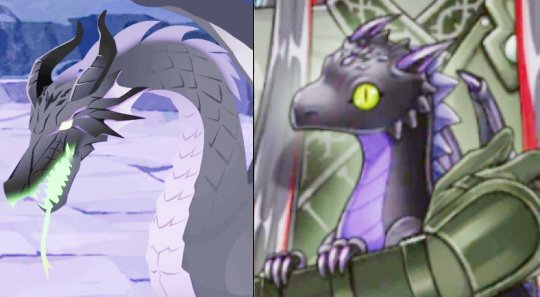
source
Comparing the frills on their cheeks... it seems like their frills grows with age and gets lighter and more connected to their eyes, it seems to get more purple skin/highlights as well.
In contrast to Meleanor's adult dragon form with hard scales, Little Malleus seem to have softer skin/scales, so i think their hard scales develop over time too. Also their snout gets more patterned too.
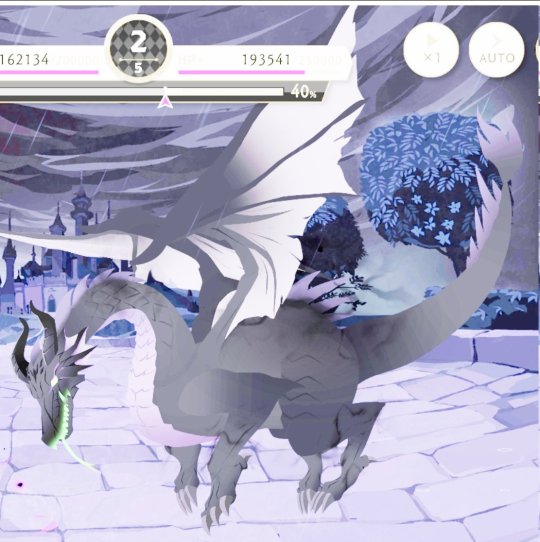
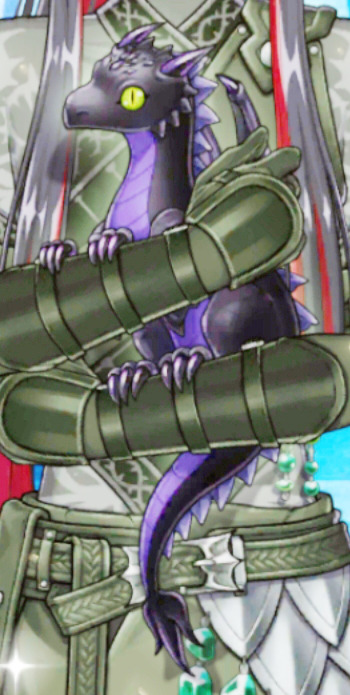
The spikes on their backs seems to separate as they get larger. Looking at Little Malleus, he has spikes that are close to each other yet on Meleanor's spikes, they're kind of sectioned in her head, torso, and her tail.
Their horns grows darker as it gets taller. Its noticeable on the horns of their head and on the wings.
Their horns also get more ridges over their development! Since Baby Malleus has smooth horns but now in Malleus' grown up form and Meleanor's, its more textured.
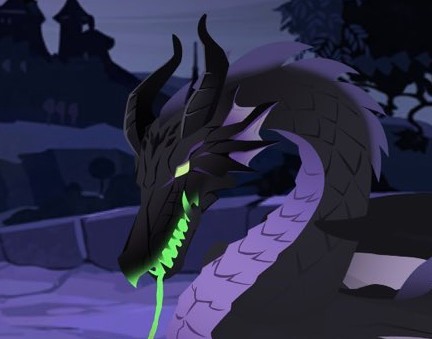
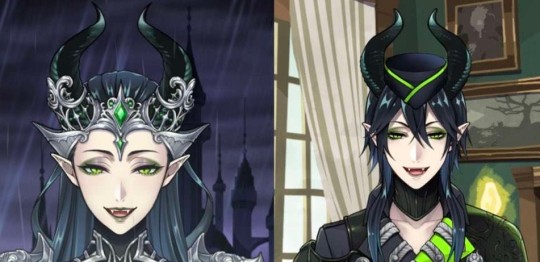
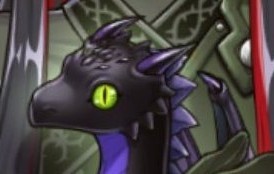
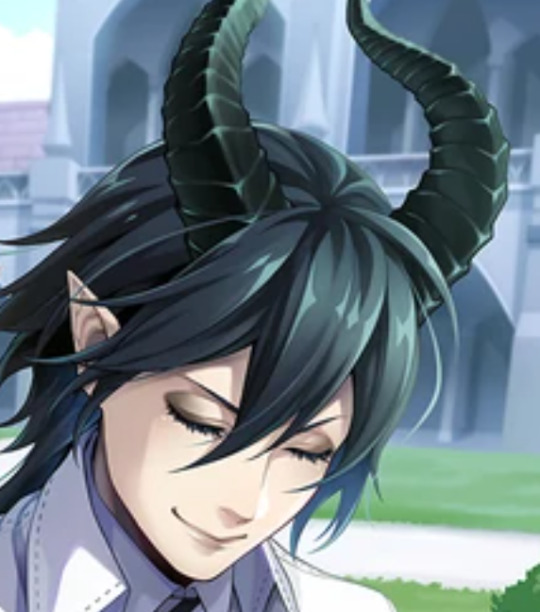
I think their horns are purple at the start then starts to get dark green??? Both Meleanor and Malleus' horns in card art always have green highlights after all.
I wonder if they're more green-colored in their human form bcs it symbolizes their empathy and how they're more humane and how connected to nature they are, but when they're in their dragon form, that green-color is reserved only in their internal organs (eyes and mouth), so "they shut their kindness off".
As a result, their form is mostly dark purple on their dragon form, the color of (evil?) void magic. So, its like when theyre in their dragon form, they're encasing their empathy inside to showcase how cruel/sinister they actually are, it could also convey that in their dragon form, they're not channelling their "fae magic" but their controlled power over "darkness/evil/hell"
Malleus after all said, he's the ruler of those who follow the darkness, Meleanor is the evil princess, and Maleficent has all the powers of hell.
Also I realized Meleanor (based on the Battle pic), might be as big as a entire castle and that's just her at ~300 years old... She looks like she could wrap her own castle with just her dragon form lol.. So I'm really curious at how massive Malleus dragon form is... Maybe its Ramshackle size for now since he's just 178 years old so might not be a dragon at a size of an entire castle yet-
These are just my thoughts after staring at Meleanor for so long kwhkdhsk also bcs I want more Baby Malleus content,,,, It's what Meleanor would've wished😔😔 especially the time where he first transformed into a human🥺💕💝 I think it'll be precious to see Baby Malleus clutching to Lilia for dear life because he can't balance on two human legs jdkdhlssj🥹🥹💝💖💖 Imagine Lilia's surprise seeing Meleanor's horns on their kid as soon as Malleus transformed to a human,,, 🥹🥹🥹 Levan, where are your genes...
#twst#twisted wonderland#disney twisted wonderland#twistedwonderland#malleus draconia#lian notes#disney twst#lilia vanrouge#meleanor draconia#twst meleanor#twst analysis#twst theory#twisted wonderland theory#twisted wonderland headcanons#twst diasomnia#twst malleus#twst book 7 theory#twst malleus draconia#malleus twst#twst meleanor draconia
2K notes
·
View notes
Text
Malleus Draconia versus Ortho Shroud
It seems some people are surprised at Malleus’ actions? That he destroyed the robot dogs and almost destroyed Ortho.
But I would like to point out that Malleus has always been like this; very protective of his loved ones.
For example: In Lilia’s PE vignette, he nearly took Rook’s head off because he thought Rook was trying to hurt Lilia.
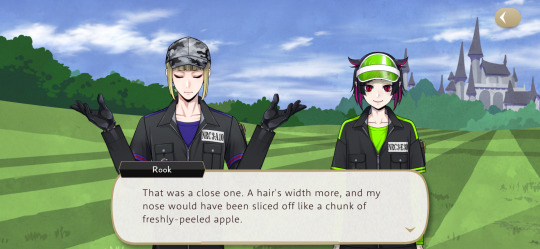
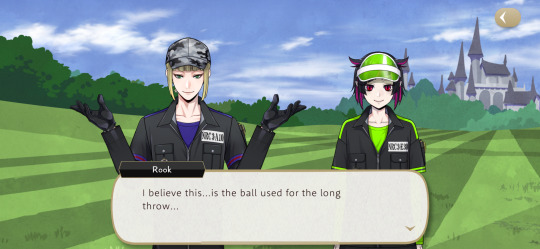
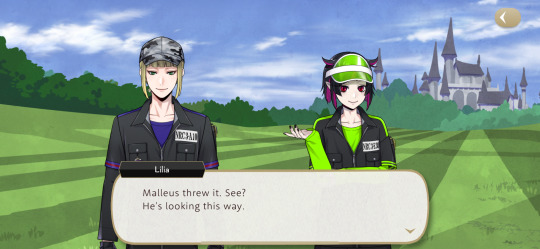
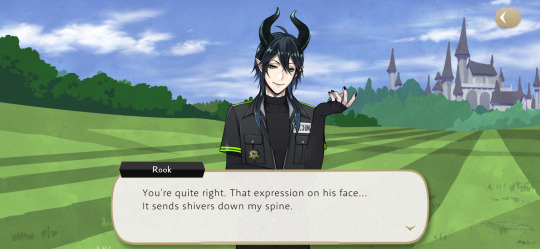
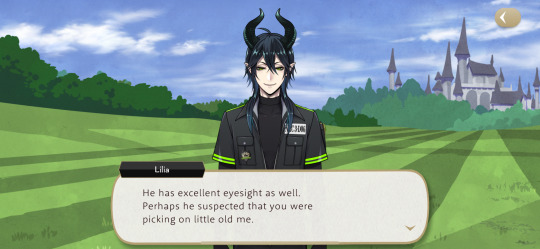
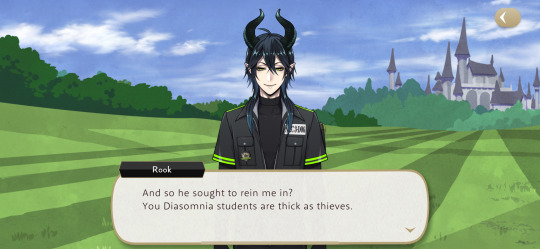
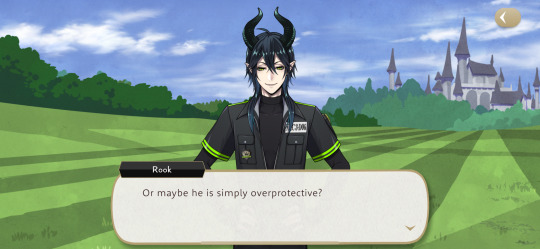
Then we come to book 7, chapter 7 update.
Yes, he destroyed the dogs and almost Ortho but remember Malleus is protective of his loved ones.
Malleus OBed because he wants his loved ones happy and Ortho is a threat to that, so of course he’s going to destroy any threats to them and Ortho basically labeled himself as such.
Now I want to bring up a point that I don’t see many talk about?
Malleus understood Ortho’s explanation about how Ortho woke up and how he was able to penetrate the barrier.
Ortho described himself as immortal basically because he can transfer his data to any body, which Malleus understood as transferring vessels.
This is when Malleus finally took the steps to destroy Ortho. Not because he wanted to kill him, but because he knew that Ortho would still live and transfer himself to another body.
Did Ortho feel fear? Yes because Orth doesn’t like lightning and that’s one of Malleus’ powers but think about it.
Feeling fear is an emotion no one wants to repeat. Malleus acknowledged that Ortho might be feeling fear
With Malleus knowing that Ortho can feel such things, Malleus told Ortho he would end him swiftly because in a way that is an act of kindess isn’t it? To end it quickly rather than prolonging the fear.
But at the same time he knows that Ortho will live and remember this emotion, and that’s what Malleus wants, so Ortho would be too scared to try again.
Malleus is protective of his loved ones and he always has been.
While his actions might seem as if he’s out of control, he isn’t. He understood in his own way what Ortho explained to him before making his move.
He didn’t attack because he’s raging but made a more calculative move on his end to stop Ortho, one that he would make repeatedly if need be, since he knows that Ortho can transfer bodies.
#not to say that malleus is not being affected mentally#remember he now knows the truth about his birth and the senate and his grandma#on top of that he’s using a bunch of magic and been OB for awhile and people are waking up and rejecting his gift#so yes he’s being affected mentally and emotionally but this post is not about that#it’s about how his actions are not surprising and how he took a calcualtive strategy not one where he’s unhinged and going to kill ortho fo#no reason but because he knew that ortho would be alive and well#additionally malleus being evil was very hot this is what you should expect from a far#ortho shroud#malleus draconia#twst book 7#diasomnia#twst malleus draconia#twst theory#twst theories#twst ortho shroud#lilia vanrouge#twst analysis#disney twst#twst#twisted wonderland
486 notes
·
View notes
Text
Which Housewarden Has the Most Practical Signature Spell?
This question was triggered by my thinking about the signature spells the housewardens have are… not always super useful under most circumstances. As this post will be covering all housewarden signature spells, there will be spoilers for Book 7 parts only available in JP.
Riddle Rosehearts. Signature spell: Off with your head. Creates a collar around the neck of the target(s) which prevents them from using magic.
It was Riddle’s signature spell that got me thinking about this in the first place, honestly. Mostly because his spell seems very practical on its face. He’s actually the housewarden who seems to use his signature spell the most, after Azul, which would make it very practical. Right?
Except his spell is only practical at all because of two specific circumstances. One, he is in a position of authority and able to deal out punishment to rule breakers, and two, he is in a location with a lot of magic users. In Twisted Wonderland, humans who use magic are much less common than humans who do not use magic. Outside of NRC, Riddle’s spell isn’t going to have much more use than a fancy collar about 90% of the time.
In summary, Riddle’s spell appears practical, but only because he’s in the perfect circumstances for it. If he was in different circumstances, it would be much less useful. 5/10
Leona Kingscholar. Signature spell: King’s Roar. Causes anything of Leona’s choosing within a certain radius to crumble into sand.
This is, again, a spell that is only practical under certain circumstances. It’s definitely a powerful spell, but you’re not exactly going to be whipping it out every single day, unless you’re a glassmaker (and even then, you need specific sand to make glass and we don’t know what kind of sand Leona makes).
That being said, it’s not like the spell has no practical uses. It’s an extremely powerful offensive spell and it means people would certainly be cautious about approaching Leona in a combat situation. He’s a prince as well, so we need to consider that he’s more likely to get targeted for political reasons. A powerful spell like his would be a deterrent and a means of protecting himself and defending others.
All in all, it’s another powerful spell, but it’s hardly one you’re going to get much use out of under normal circumstances. 4/10.
Azul Ashengrotto. Signature spell: It’s A Deal. By signing a scroll, Azul can take any power he chooses as part of a contract. If the terms are broken, the contracted party will have to obey Azul.
Okay, so this one’s a weird one. It’s been stated before in canon (I believe Jade and Floyd touch on this right around Azul’s overblot) that Azul does not HAVE to make a contract in order to take a power. He can just do it (he was using his signature spell when he overblotted, for example, without needing the contract). However, this is difficult to control (since he just sucks out ALL a target’s abilities instead of one) and it skirts along the lines of forbidden magic, so he uses the contracts.
Obviously, this limits practicality. To gain the power, he needs to get the target to agree to the contract and he needs to fulfill whatever his end of the bargain is. However, Azul is cunning and good at hiding his motivations to get what he truly wants. He can’t get people who don’t agree, but he can leverage people to get them to do so.
In general? This is the most practical spell we’ve seen so far. It’s got wide applicability (it seems to be implied in his backstory that he’s not limited to taking magic) and it’s something that can be used every day, even making it part of your job (which he does)! 9/10, subtracting a point for the inconvenience of the contracts.
Kalim Al-Asim. (What, were you expecting Jamil? Read the top again- it’s housewardens, not overblotters!) Signature Spell: Oasis Maker. Using only a small amount of magic, Kalim can create a downpour.
This is one of the spells that got me thinking about how practical some spells are, because this spell is discussed as impractical in story. Kalim states that the spell is mostly useless in a time of irrigation and running water. It’s good for some water fun, but not a super useful spell. In some ways, this could be seen as a reflection of Kalim himself, or maybe even how he sees himself: fun and flashy, but not really useful.
This makes it more interesting when, later in the chapter, Azul notes that the spell is incredibly useful in a different context! Go to a land without water and suddenly Kalim is a king. That’s why he’s wealthy in the first place- being able to create water made his family important. And it could be another commentary on Kalim- he’s really only fun and flashy in this setting, but he’s also more capable of being beneficial to those around him than he realizes.
So. Is Kalim’s spell practical? Well, yes and no. Azul’s right in that it’s more practical than Kalim was thinking, but that practicality is context specific. But being able to make clean water no matter what is useful in a lot of survival situations, and could help a lot of people, so… 4/10. Practical under the right circumstances.
Vil Schoenheit. Signature spell: Fairest One of All. Vil is able to curse any item with any condition he chooses.
So, uh. Does anyone else think this is like. Ridiculously overpowered? Might as well just give him the ‘do whatever you want all the time’ spell because that’s basically what this is. He has, in canon, paralyzed people with food, almost put someone into a cursed sleep with food, created acid, and paralyzed someone by getting them to touch lakewater. What. The. Hell. Are there limits on this spell? Is Vil perpetually one mental breakdown away from creating ‘you obey everything I say now’ water and dumping it over a crowd????
Okay. Rambling aside. This is a ridiculously practical spell. Clearly there are limits (I would imagine he can only affect so many people/things or hold it for so long before he can’t keep it up anymore) but it’s pretty damn strong. 10/10.
Idia Shroud. Signature Spell: Gate to the Underworld. Idia can open the gate to the Underworld in the S.T.Y.X. headquarters.
I feel bad but... It's not the world's most practical spell, is it? It's cool, and clearly necessary, don't get me wrong, but like. How often does this come up in day-to-day living? It might be practical for his job, I guess, but it doesn't seem to be useful in most circumstances.
I obviously can't rate this one very highly. Sorry, Idia. One point for its usefulness to his job. 1/10.
BOOK 7 SPOILERS
Malleus Draconia. Signature Spell: Fae Maleficence. Allows him to put people into ageless sleep while surrounding the area with a wall of briars and thorns.
This one's a harder spell to categorize, because we know what the spell has done so far, but we don't know it that's all it can do. I may be wrong on this, because I've only read the portions of the chapter that have come out in English, but it's not confirmed that this is the only thing his spell can do- like it's never been stated 'Malleus' spell puts people to sleep always.' It could be that this is the extent of his spell, but it could also be more like Vil's spell. If we'd only read Book 5 and he hadn't explained it, we could have assumed that Vil's spell could only be used on food. But it's actually much broader. I'm saying this because I don't want to rule out that Malleus' spell might be even more powerful or flexible than shown.
That being said, I can only judge on what I have. And what I have now is the ageless sleep bit. It's certainly not the most practical spell ever, though it could have its uses. As a defensive spell, it seems pretty good. You could trap an army with it, or create a protective barrier for your people until danger has passed. Still, I don't think this is a spell Malleus could use every day.
It's primarily for defensive purposes, so same as Leona's. 4/10.
#twisted wonderland#twst#twisted wonderland analysis#twst analysis#twst talk#twst housewardens#riddle rosehearts#Leona kingscholar#azul ashengrotto#kalim al asim#vil schoenheit#idia shroud#malleus draconia
149 notes
·
View notes